Cities in Europe
In 2020, 36 cities on the European continent have enough respondents to qualify for the Expat City Ranking:
- 1. Valencia, Spain
- 2. Alicante, Spain
- 3. Lisbon, Portugal
- 6. Málaga, Spain
- 9. Madrid, Spain
- 11. Graz, Austria
- 13. Nice, France
- 16. Vienna, Austria
- 17. Moscow, Russia
- 18. Luxembourg City, Luxembourg
- 23. Prague, Czechia
- 24. Basel, Switzerland
- 25. Barcelona, Spain
- 26. Dusseldorf, Germany
- 27. Amsterdam, Netherlands
- 28. Lausanne, Switzerland
- 29. Frankfurt am Main, Germany
- 31. The Hague, Netherlands
- 32. Brussels, Belgium
- 33. Hamburg, Germany
- 35. Tallinn, Estonia
- 36. Helsinki, Finland
- 37. Zurich, Switzerland
- 41. Munich, Germany
- 43. Budapest, Hungary
- 44. Berlin, Germany
- 45. Stockholm, Sweden
- 46. Copenhagen, Denmark
- 48. Geneva, Switzerland
- 49. Stuttgart, Germany
- 50. Athens, Greece
- 51. London, UK
- 58. Dublin, Ireland
- 61. Paris, France
- 63. Milan, Italy
- 65. Rome, Italy
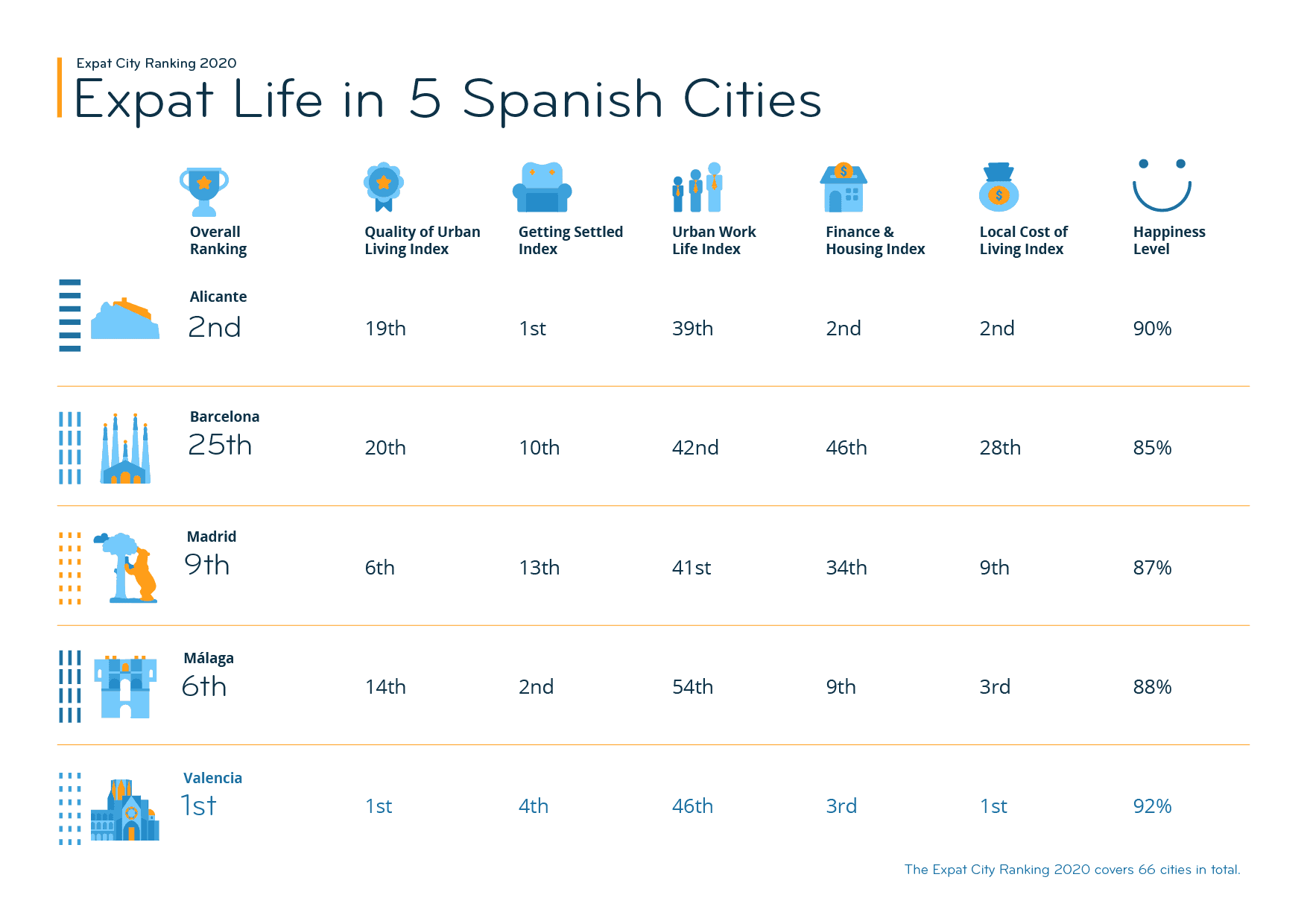
1. Valencia, Spain
Coming in 1st place out of 66 cities worldwide, Valencia is the best destination for expats, according to the Expat City Ranking 2020. The Spanish city is among the top 5 in all topical indices but one. It even ranks first worldwide in both the Quality of Urban Living and the Local Cost of Living Indices. In fact, 94% of expats rate the local cost of living positively (vs. 46% globally), and 91% consider healthcare easily available (vs. 74% globally). This places the city first in the Health & Environment subcategory. Expats are also very happy with the local climate and weather (2nd) and the leisure options (4th).
With more than four in five expats (82%) saying that housing in Valencia is affordable (vs. 41% globally), it also comes first for this factor. Overall, the Spanish city ranks third in the Finance & Housing Index. A US American expat lists “the quality of life and the cost of living” as their favorite things about Valencia. Apparently, it is also easy to get settled in Valencia, which comes fourth in this index. More than four in five expats (84%) find it easy to get used to the local culture (vs. 61% globally), and 91% say that the local residents are generally friendly (vs. 68% globally).
The Urban Work Life Index (46th) is Valencia’s only sore point. In the Job & Career subcategory, it only ranks 62nd, with 46% of expats saying they are unhappy with their local career opportunities (vs. 34% globally). A French expat says that “finding employment has always been difficult” for them. Moreover, expats are not happy with the local economy: fewer than five in nine expats (54%) rate this aspect positively, which is nine percentage points below the global average (63%).
2. Alicante, Spain
Placing 2nd out of 66 destinations, Alicante is one of the best cities worldwide for expats, beaten only by neighboring Valencia (1st). The city ranks among the global top 3 in the Finance & Housing (2nd), the Local Cost of Living (2nd), and the Getting Settled (1st) Indices. In fact, 83% of expats feel at home there (vs. 64% globally), and 68% find it easy to make friends in Alicante (vs. 47% globally). A British expat appreciates the “easy way of life and the friendliness of people around me”. In terms of finance, 81% of expats are satisfied with their financial situation (vs. 61% globally). Additionally, more than two in three survey respondents (68%) say that housing in Alicante is affordable (vs. 41% globally), and 82% rate the cost of living in general positively (vs. 46% globally).
Similar to Valencia, Alicante shows a comparably weak performance in the Urban Work Life Index (39th). For example, 44% of expats rate their local career opportunities negatively (vs. 34% globally), putting the city into the bottom 10 worldwide for this factor (57th). In the Quality of Urban Living Index (19th), the city also receives lower results, which is partly due to public transportation (46th). On the other hand, Alicante receives great results for the availability of healthcare (89% satisfied vs. 74% globally), as well as the local climate and weather (97% satisfied vs. 64% globally).
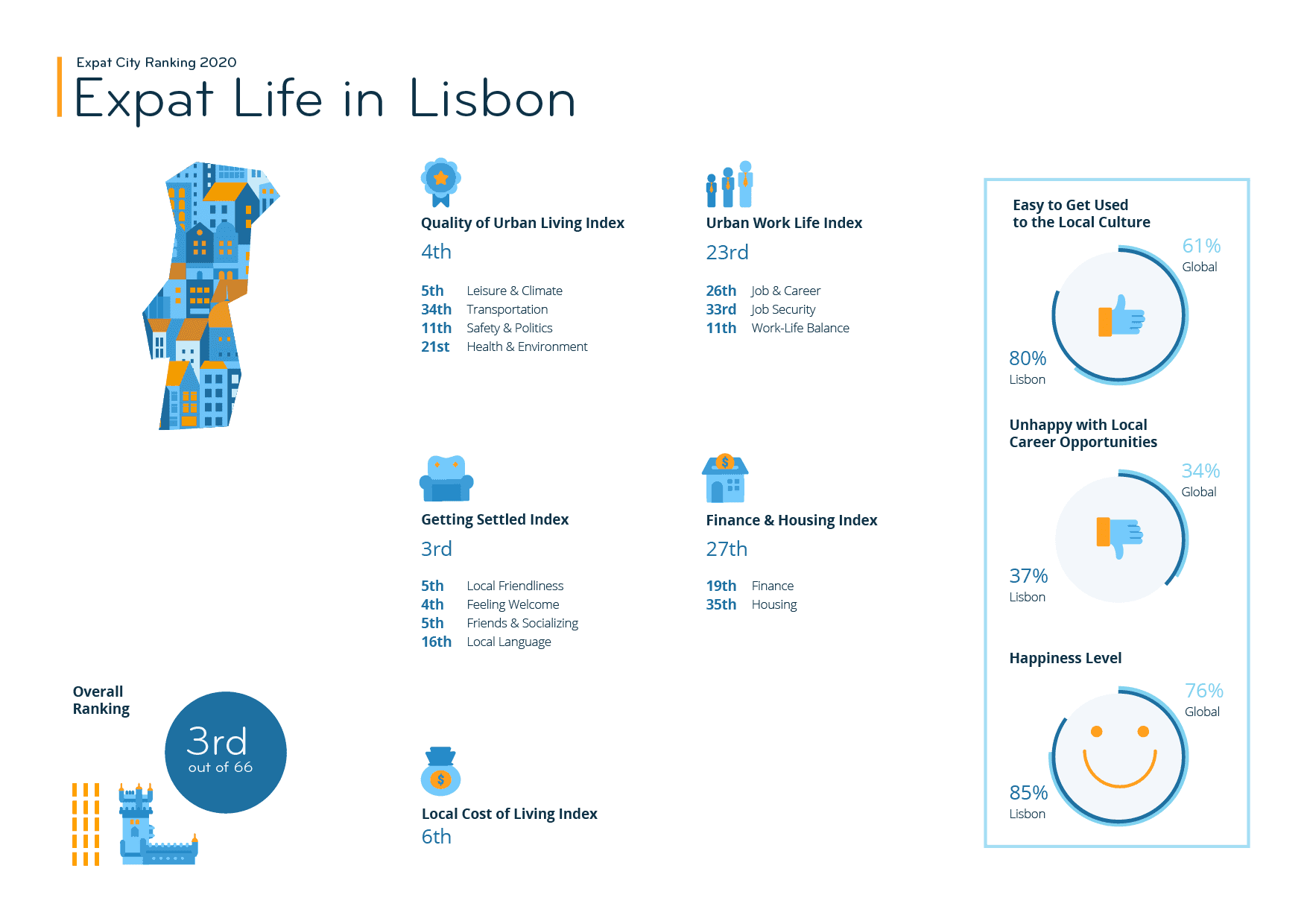
3. Lisbon, Portugal
Coming in 3rd place out of 66 cities in the Expat City Ranking, Lisbon performs well across the board. It does especially well in the Getting Settled Index (3rd), and 82% of expats feel at home in the city (vs. 64% globally). Another 79% are happy with their social life there (vs. 59% globally), placing the city third worldwide for this factor as well. The Quality of Urban Living Index (4th) showcases how much expats like Lisbon, with the Portuguese capital coming fifth in the Leisure & Climate subcategory. In fact, 89% of expats are satisfied with the local leisure options (vs. 71% globally). A Brazilian expat likes to spend her leisure time “on the beach in the sun”. Moreover, 96% of expats are happy with Lisbon’s weather and climate (vs. 64% globally), and 56% even very much so (vs. 26% globally). A Canadian expat likes the “good weather and the safe environment”. Nearly all expats in Lisbon (99%) feel the same way about their personal safety (vs. 82% globally).
While Lisbon also ranks a good sixth in the Local Cost of Living Index, with 64% of expats being satisfied with this aspect (vs. 46% globally), it does not perform as well in the Finance & Housing Index (27th). Nearly three in eight expats (37%) find it difficult to find housing in Lisbon (vs. 27% globally). Lastly, they city gets mixed results in the Urban Work Life Index (23rd): Expats are very happy with their jobs in general (79% happy vs. 65% globally) and their personal work-life balance (83% happy vs. 64% globally). But they are unhappy with the local career opportunities (37% unhappy vs. 34% globally) and the state of the local economy (19% unhappy vs. 18% globally).
6. Málaga, Spain
Ranking 6th out of 66 destinations in the Expat City Ranking, the Spanish coastal city performs best in the Getting Settled Index (2nd), where only Alicante (1st) ranks even better. Málaga comes first in both the Friends & Socializing and the Feeling Welcome subcategories, with 87% of expats feeling at home there (vs. 64% globally). Additionally, 77% of survey respondents are happy with their social life in Alicante (vs. 59% globally).
An expat from the UK lists “the friendships as well as the happiness and friendliness of expats and locals” as their favorite things about life in Málaga. In fact, the vast majority of respondents rates the friendliness of the local population positively (88% vs. 68% globally). The city also performs very well in the Local Cost of Living (3rd) and the Finance & Housing (9th) Indices. Almost nine in ten expats (88%) are happy with the local cost of living (vs. 46% globally), and 79% are happy with their own financial situation as well (vs. 61% globally). Moreover, more than half the expats (54%) describe housing in Málaga as affordable (vs. 41% globally).
Málaga lands among the top 15 in the Quality of Urban Life Index (14th), performing best in the Leisure & Climate subcategory (2nd). All expats (100%) are happy with the climate and weather in Málaga (vs. 64% globally), and 92% are satisfied with the availability of healthcare (vs. 74% globally). On the downside, Málaga receives rather weak results in the Urban Work Life Index (54th). It even ranks 65th for local career opportunities — only ahead of Rome — since just one in ten expats (10%) is happy with the local career options (vs. 43% globally).
9. Madrid, Spain
Ranking 9th out of 66 destinations in the Expat City Ranking 2020, Madrid is the last Spanish city to make it into the top 10 — right after Málaga (6th), Alicante (2nd), and Valencia (1st). The Spanish capital does especially well in the Quality of Urban Living Index (6th), coming eighth in the Leisure & Climate subcategory: more than nine in ten expats (92%) are happy with its leisure options (vs. 71% globally), which puts Madrid in first place worldwide for this factor. “I really like the leisure and entertainment options here,” says a Venezuelan expat, and a US American also appreciates that there are “a lot of activities to do with friends”. Additionally, 89% are satisfied with the local climate and weather (vs. 64% globally).
Madrid also receives very good results in the Local Cost of Living Index (9th), with 64% of expats rating this aspect positively (vs. 46% globally). An expat from Canada says that the “climate and cost of living” are their favorite things about life in Madrid. Despite the apparently low cost of living, finances are not great in Madrid. Madrid ranks 34th in the Finance & Housing Index and just 47th in the Finance subcategory. In fact, 30% say that their disposable household income is not enough to all expenses (vs. 21% globally). The Urban Work Life Index (41st) looks similarly grim: Madrid only ranks 46th in the Job Security subcategory, and 17% of expats are dissatisfied with the state of the local economy (vs. 18% globally). A US American expat shares: “The job market is horrendous, and salaries are stagnant — I do not see the opportunity here.” In fact, one in three expats (33%) is also dissatisfied with local career opportunities (vs. 34% globally).
On the bright side, Madrid does rank well in the Getting Settled Index (13th). Most expats (83%) feel at home in the Spanish capital (vs. 64% globally), and 79% find it easy to get used to the local culture (vs. 61% globally).
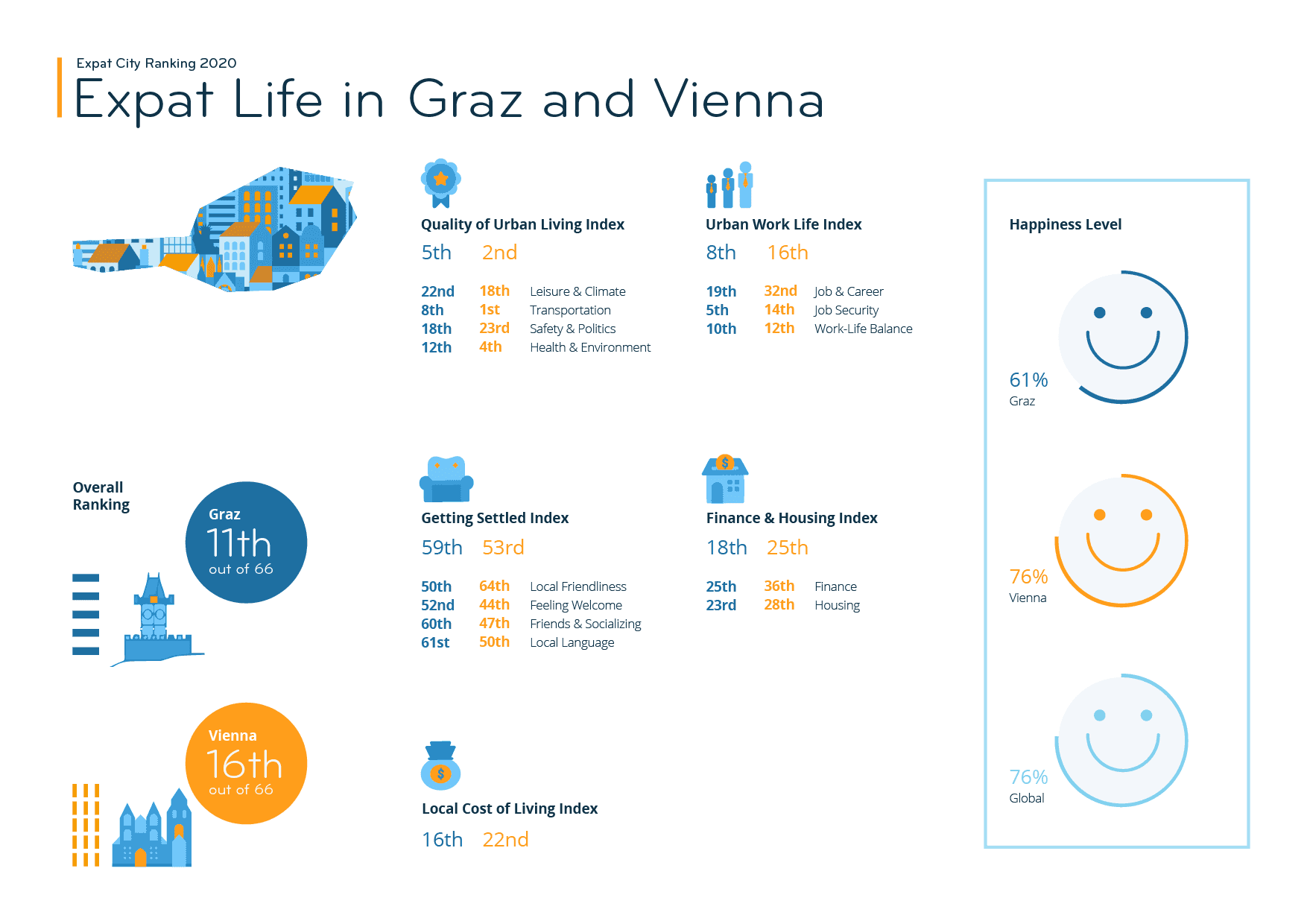
11. Graz, Austria
Coming 11th out of 66 destinations in total, Graz narrowly misses out on a spot among the top 10 cities worldwide. This Austrian city performs better than the capital Vienna (16th), and it ranks among the top 10 in both the Quality of Urban Living (5th) and the Urban Work Life (8th) Indices. Regarding the quality of urban living, Graz stands out with its public transportation system: 96% of expats rate this factor positively (vs. 66% globally). Additionally, it lands in fifth place for its urban environment, with 92% of survey respondents happy with this factor (vs. 65% globally). A Tunisian expat living in Graz lists the “nature, quality of life, infrastructure, and green spaces” as things he likes most about his life abroad. In the Urban Work Life Index, Graz comes fifth in the Job Security subcategory and tenth in the Work-Life Balance subcategory. In fact, 80% of expats in Graz are happy with their job security in Austria (vs. 59% globally), and 79% rate their working hours positively (vs. 65% globally).
On the downside, Graz loses a lot of points in the Getting Settled Index (59th), even ranking among the bottom 10 in this category. The Austrian city comes in 60th place in the Friends & Socializing subcategory, with 41% of respondents unhappy with their social life in Graz (vs. 24% globally). Moreover, 45% of expats find it difficult to find new friends (vs. 33% globally). “It is not easy to make friends. Austrians tend to stick with Austrians and do not speak much English or enjoy speaking English. So, sometimes I feel lonely,” shares a South African expat. The local population of Graz is also not perceived as very friendly towards foreign residents (37% negative ratings vs. 18% globally), which leads to poor results in the Local Friendliness subcategory (50th).
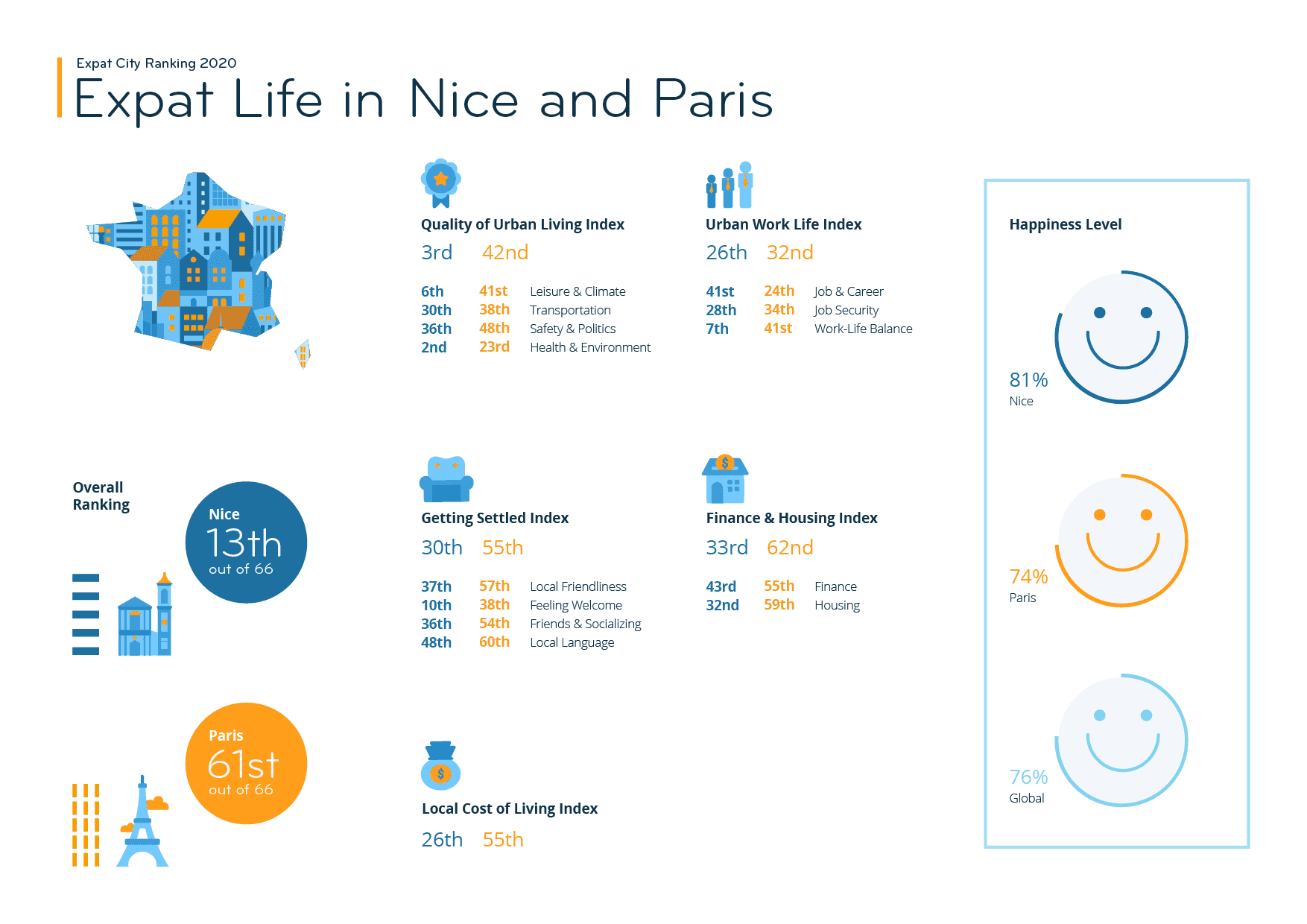
13. Nice, France
Coming 13th out of 66 cities in the Expat City Ranking 2020, Nice ranks far ahead of Paris (61st). It even comes in third place in the Quality of Urban Living Index, only beaten by Vienna (2nd) and Valencia (1st). For example, more than nine in ten expats (92%) rate the availability of healthcare positively (vs. 74% globally). “The medical care here is really superb,” says an expat from the Philippines. Nice also comes sixth in the Leisure & Climate subcategory: not a single survey respondent (0%) is unhappy with the local climate and weather (vs. 20% globally).
Although Nice ranks a lot better than Paris (62nd) in the Finance & Housing Index, it still comes only in a mediocre 33rd place. Over one in four expats (27%) are dissatisfied with their financial situation (vs. 21% globally), and just 36% find it easy to find housing in Nice (vs. 55% globally). However, housing seems to be fairly affordable as just one in three expats (33%) rates this factor negatively (vs. 41% globally).
Lastly, Nice ranks 30th in the Getting Settled Index. When it comes to the Feeling Welcome subcategory, expats feel a lot more welcome in Nice (10th) than in Paris (38th). In fact, 75% of expats feel at home in Nice (vs. 64% globally), and 58% are happy with their social life, about the same as the global average (59%).
16. Vienna, Austria
Placing 16th overall, Vienna performs generally well in the Urban Work Life (16th), Finance & Housing (25th), and Local Cost of Living (22nd) Indices. However, when it comes to the two other indices featured in the survey, the results could not be any more different: Austria’s capital city does best in the Quality of Urban Living Index (2nd), where it is only preceded by Valencia, Spain (1st). Expats are particularly happy with the local transportation system (96% positive ratings vs. 66% globally), ranking the city first worldwide for this factor. Vienna is also one of the top 5 cities in the Health & Environment subcategory (4th), with 89% of survey respondents happy with the urban environment (vs. 65% globally) and 86% satisfied with the availability of healthcare (vs. 74% globally). “Vienna is a wonderful city with a high quality of life,” says a German expat. “The infrastructure, public transportation, and healthcare are working very well. And the environment of Vienna is beautiful and diverse.”
However, Vienna ranks low in the Getting Settled Index (53rd) and is even among the bottom 3 cities in the Local Friendliness subcategory (64th). Only Salmiya in Kuwait (66th) and Prague, Czechia (65th), perform poorer for local friendliness. Close to three in eight survey respondents in Vienna (37%) rate the general friendliness of the local residents negatively (vs. 17% globally), and 42% consider them unfriendly towards foreign residents (vs. 18% globally). A British expat living in Vienna says that he does not like “the unfriendly attitude of some Austrians towards certain foreigners”.
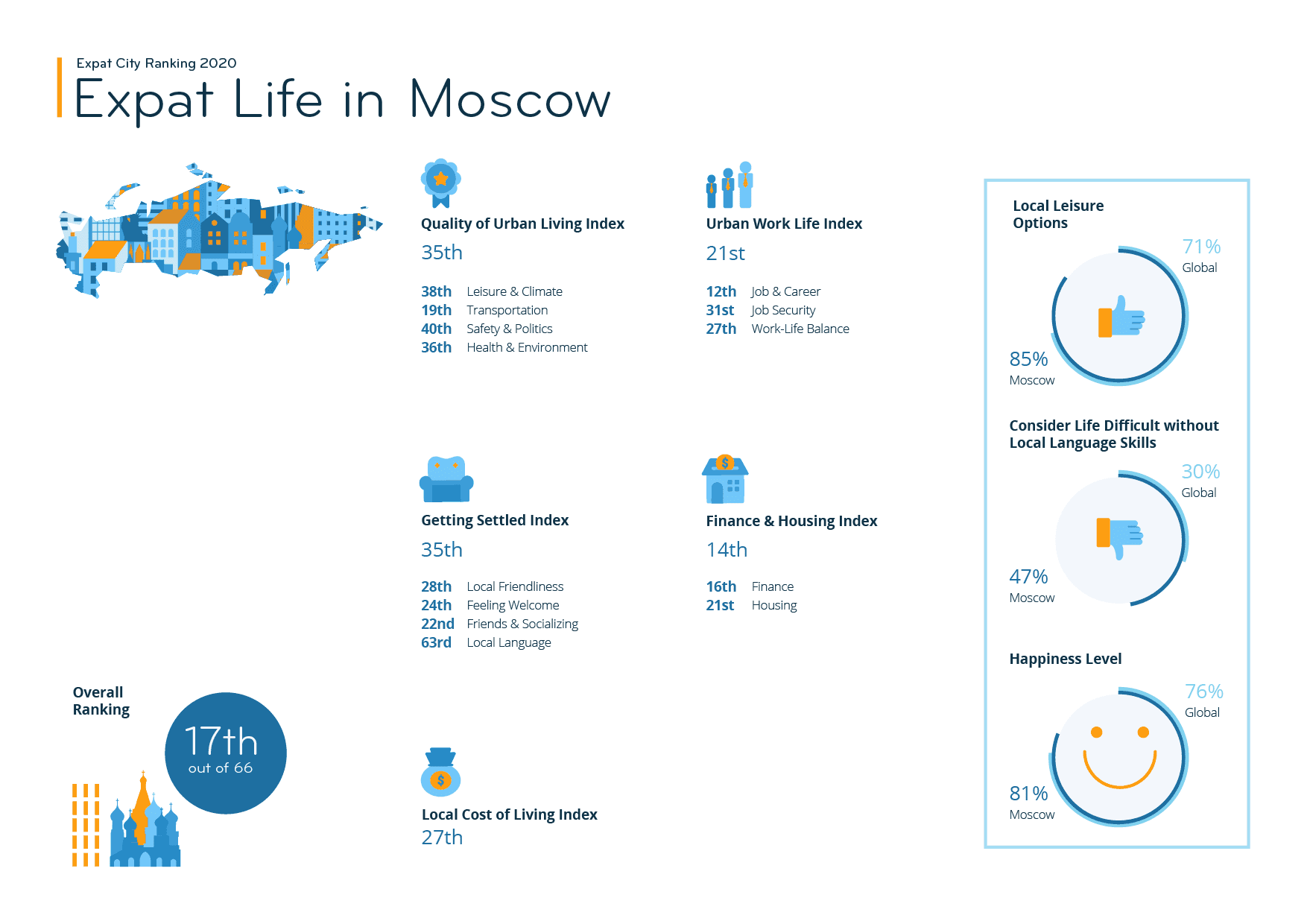
17. Moscow, Russia
Moscow comes 17th out of 66 destinations in the Expat City Ranking 2020. The city does especially well in the Finance & Housing Index (14th), with 68% of expats satisfied with their financial situation (vs. 61% globally). Another 46% of respondents say that housing in Moscow is affordable (vs. 41% globally). Moscow also receives good results in the Urban Work Life Index (21st), even ranking third worldwide for overall job satisfaction. In fact, 73% of expats are happy with their jobs (vs. 65% globally).
However, Moscow ranks just below the average in both the Quality of Urban Living and the Getting Settled Indices (35th for both). On the one hand, 68% of expats are satisfied with their social life (vs. 59% globally), and 54% find it is easy to make friends in Moscow (vs. 47% globally). An Austrian expat says that “the people are very warm”. On the other hand, expats in Moscow do have a hard time with the local language, which puts the city in a disappointing 63rd place in this subcategory. Close to two in three survey respondents (66%) say that it is difficult to learn the local language (vs. 46% globally), which is an issue since 47% find it hard to get around in Moscow without knowing the local language (vs. 30% globally).
Regarding the urban quality of life, Moscow comes 38th in the Leisure & Climate subcategory: expats are unhappy with the climate and weather (39% unhappy vs. 20% globally) but do like the local leisure options (85% vs. 71% globally). And while nearly nine in ten expats (88%) are satisfied with the local transportation (vs. 66% globally), only 77% feel safe in Moscow (vs. 82% globally).
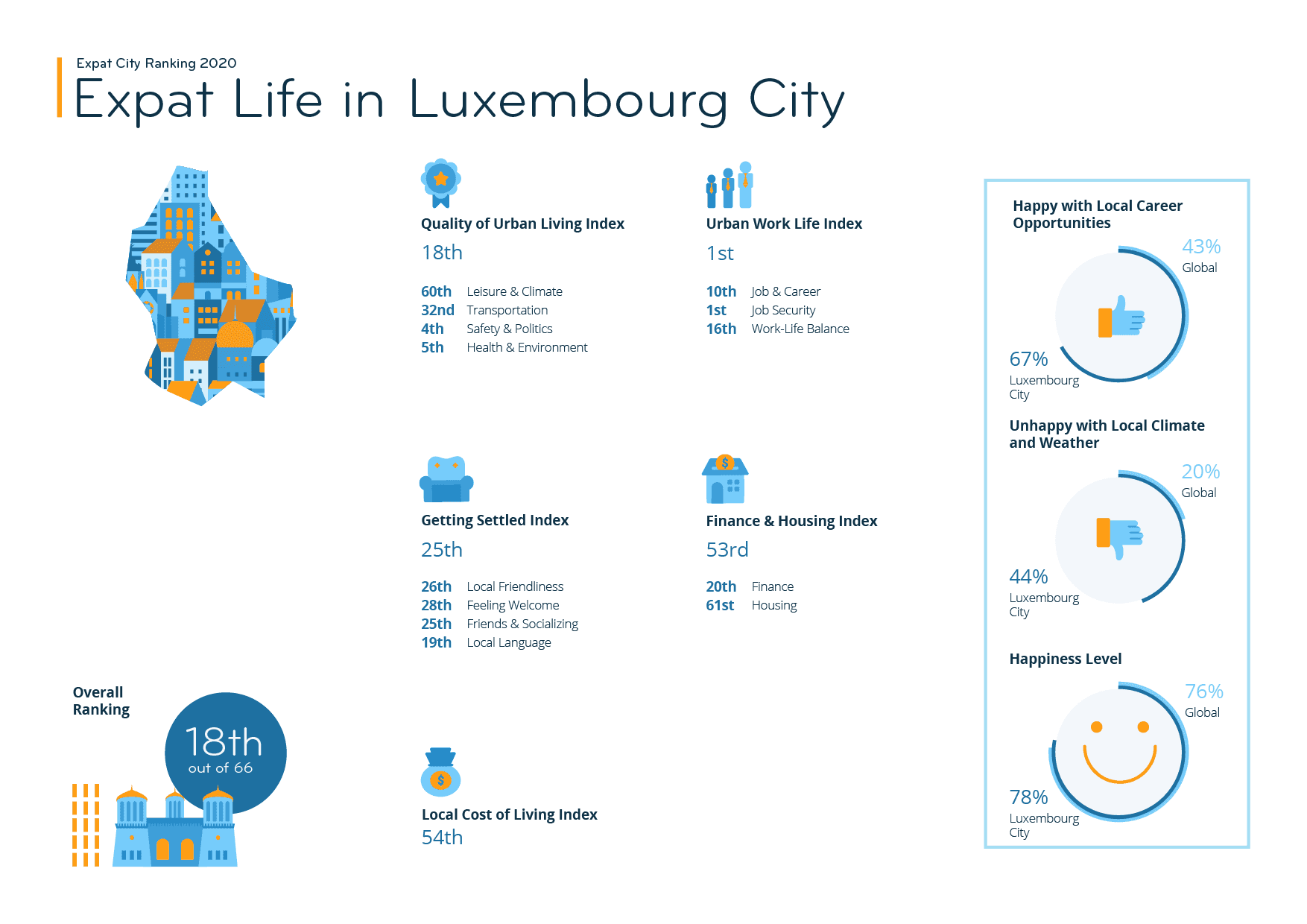
18. Luxembourg City, Luxembourg
Placing 18th out of 66 cities in the Expat City Ranking 2020, Luxembourg’s capital is a top destination for expats looking for a great working life. With Luxembourg City ranking first worldwide in the Urban Work Life Index, the majority of expats is happy with their job security (80% vs. 59% globally) and the state of the local economy (97% vs. 63% globally). A Greek expat even names the “stability of the economy” as their favorite thing about living in Luxembourg City. The city also comes in at a good 18th place in the Quality of Urban Living Index, despite its low ranking in the Leisure & Climate subcategory (60th). This is balanced out by the top 5 rankings for health and environment (5th) and safety and politics (4th). Nearly all expats are happy with Luxembourg City’s political stability (97% vs. 61% globally) and feel safe there (92% vs. 82% globally). An Irish expat summarizes: “I like the safety and job security here.”
However, all this comes at a price: Luxembourg City ranks low in both the Local Cost of Living Index (54th) and the Finance & Housing Index (53rd). It even comes 64th out of 66 cities for the affordability of housing, only ahead of Hong Kong (65th) and Dublin (66th). In fact, close to nine in ten expats (86%) find housing unaffordable (vs. 41% globally). An expat from Mauritius thinks that the “real estate prices are too high” and worries about the “high cost of living”. In fact, 65% of expats rate the latter negatively (vs. 36% globally).
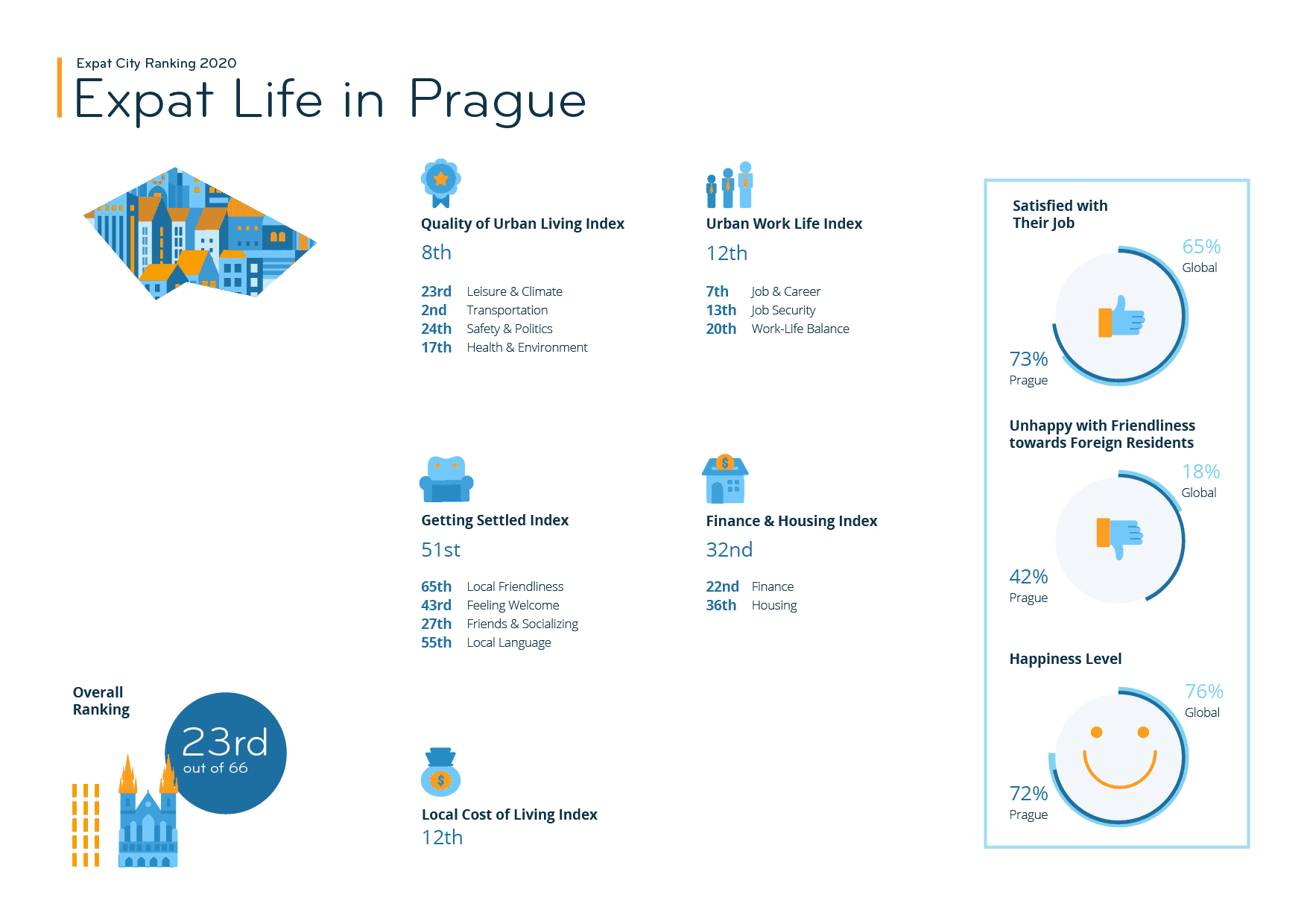
23. Prague, Czechia
In the Expat City Ranking 2020, Prague ranks 23rd out of 66 cities in total. It makes it into the top 10 in the Quality of Urban Living Index (8th) — for example, nearly all expats (97%) rate Prague’s public transportation positively (vs. 66% globally). This puts the city on second rank for public transportation, and it is only beaten by Vienna (1st). “The transport system in Prague is the best I have ever experienced,” shares a British expat.
With Prague coming twelfth in the Local Cost of Living Index, everyday life seems to be very much affordable for expats. A survey respondent from Slovakia says that she likes the “low of costs of services and food”; in fact, nearly three in six expats (57%) rate the local cost of living positively (vs. 46% globally). What is more, Prague also ranks twelfth in the Urban Work Life Index, which is mainly due to high overall job satisfaction among expats (73% happy vs. 65% globally). Close to two in three expats (64%) are also happy with the local career opportunities (vs. 43% globally), and 70% rate their working hours positively (vs. 65% globally).
However, Prague comes 51st in the Getting Settled Index, with less than half the expats (46%) rating the friendliness of the locals positively (vs. 68% globally). And over two-fifths (42%) describe the local residents as unfriendly towards expats (vs. 18% globally). Therefore, Prague ranks 65th in the Local Friendliness subcategory, only ahead of Salmiya in Kuwait. A Russian expat says that “a lot of times, I can perceive a negative attitude towards foreigners”. Maybe this is why just 57% of expats say it is easy to get used to the local culture (vs. 61% globally).
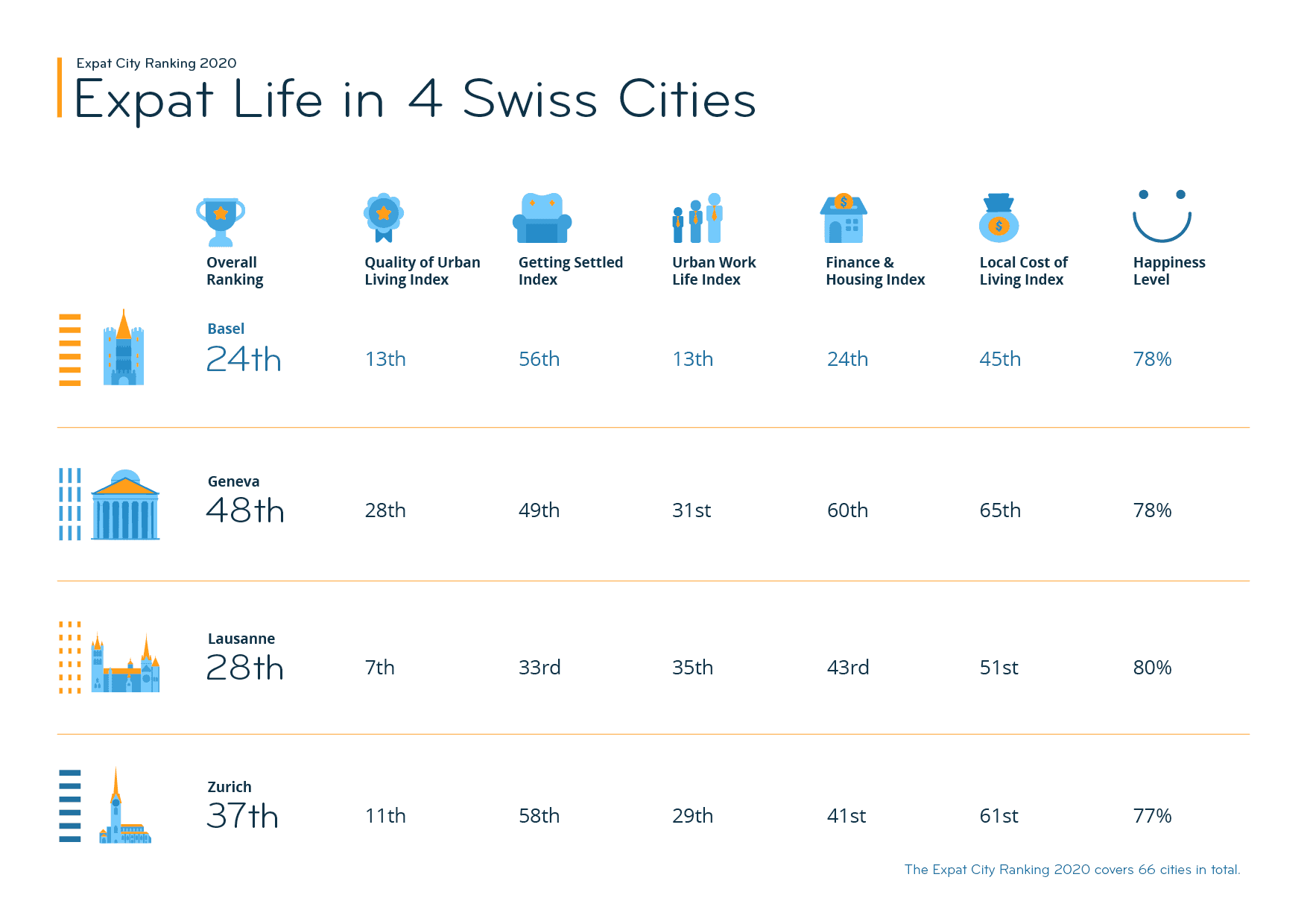
24. Basel, Switzerland
Basel comes in 24th place out of 66 cities in the Expat City Ranking 2020. Out of all the Swiss cities featured in the survey, Basel ranks best for urban work life (13th). Nearly all expats (97%) are satisfied with the state of the local economy (vs. 63% globally). The Swiss city also ranks 13th in the Quality of Urban Living Index: 95% of expats are happy with the public transportation system (vs. 66% globally), and 88% rate the urban environment positively (vs. 65% globally). Basel performs better than average in the Finance & Housing Index (24th) — well ahead of Geneva (60th), Lausanne (43th), and Zurich (41st). More than two in three expats in Basel (69%) rate their financial situation positively (vs. 61% globally). A Brazilian expat who lives in Basel lists “the financial safety and the ease of traveling” among the things he likes best about his life abroad.
However, Basel comes 56th in the Getting Settled Index, which is the second-worst result for Switzerland in this category. Moreover, the city is among the bottom 10 in both the Feeling Welcome and the Friends & Socializing subcategories (57th for both). Many expats do not feel at home in Basel (29% vs. 21% globally) and find it difficult to get used to the local culture (36% vs. 21% globally). “Locals are not open to new friendships and it is difficult to be part of the local community,” shares a Venezuelan expat. In fact, about four in seven expats (57%) have trouble finding new friends (vs. 33% globally), and 37% are unhappy with their social life (vs. 24% globally).
25. Barcelona, Spain
Ranking 25th out of 66 destinations in the Expat City Ranking 2020, Barcelona is the only Spanish city that does not make it into the top 10. It receives its best results in the Getting Settled Index (10th), doing especially well in the Friends & Socializing subcategory (3rd): 81% of expats are happy with their social life (vs. 59% globally). Also, almost four in five respondents (79%) say they feel at home in Barcelona (vs. 64% globally). In the Quality of Urban Living Index (20th), Barcelona gets great results for the local climate (96% happy vs. 64% globally) and local leisure options (94% happy vs. 71% globally). A British expat summarizes: “The climate is good, and there are plenty of opportunities for various activities.” However, personal safety (57th) seems to be an issue, with only about two-thirds (66%) rating this factor positively (vs. 82% globally).
Similar to the other Spanish cities featured in the ranking, Barcelona does not do well in the Urban Work Life Index (42nd); in the Job Security subcategory, it just comes 48th out of 66. Only 53% of expats are satisfied with the state of the local economy (vs. 63% globally). “I do not like the working conditions, the pay is too low, and the rents are high,” shares a German expat. In fact, it is the costs and finances that differentiate Barcelona from other Spanish cities: 28% of expats in the city are dissatisfied with their financial situation (vs. 21% globally), and 67% find local housing unaffordable (vs. 41% globally).
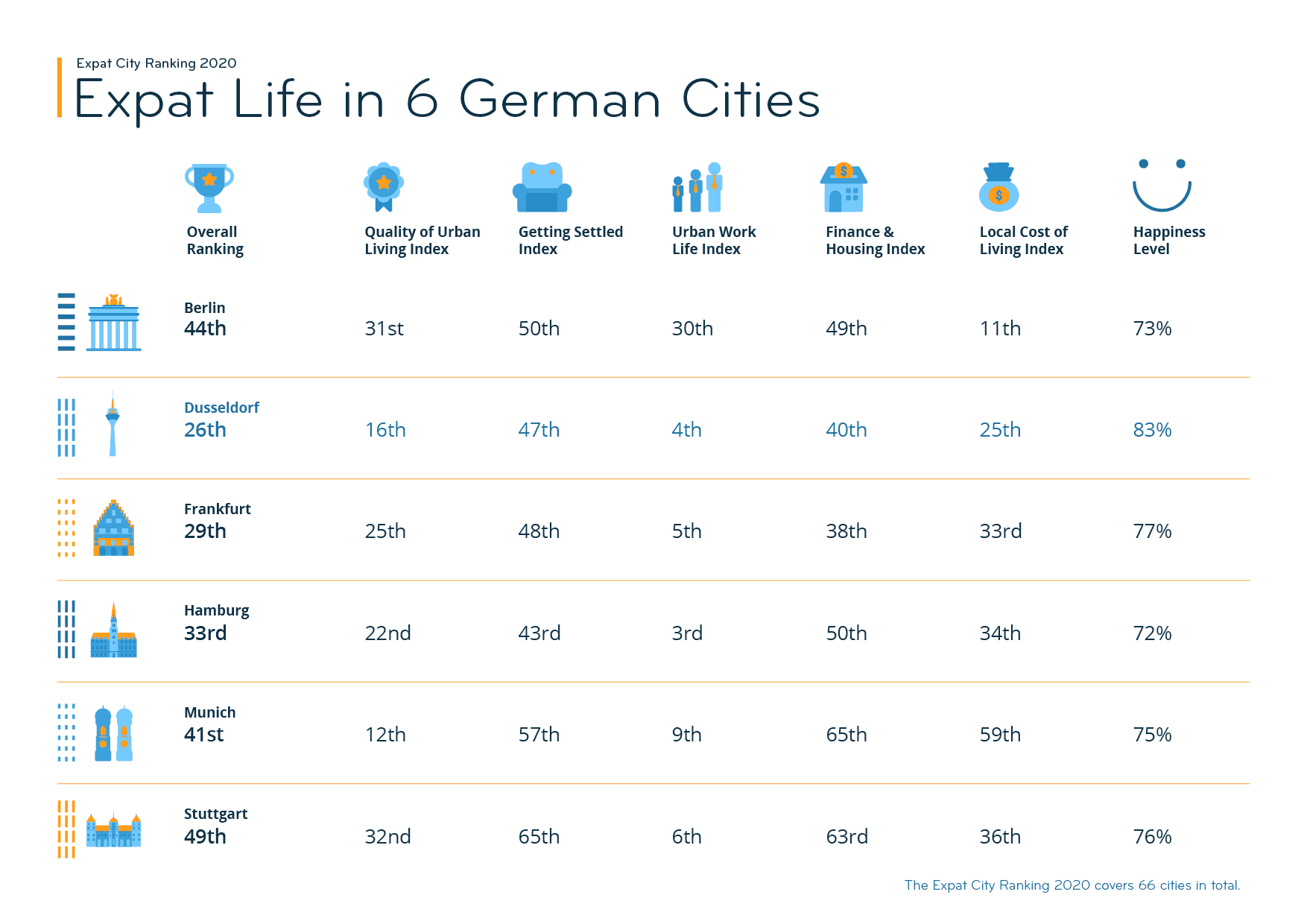
26. Dusseldorf, Germany
Overall, Dusseldorf comes in 26th place and is first among all German cities featured in the Expat City Ranking 2020. It ranks 4th out of 66 cities in the Urban Work Life Index, following close behind Luxembourg City (1st), Amsterdam (2nd), and Hamburg (3rd). In fact, nearly nine in ten expats (88%) rate the state of the city’s economy positively (vs. 63% globally), and 58% are happy with the local career opportunities (vs. 43% globally). A French expat mentions “the good dynamic job market” as one of the things she likes about living in Dusseldorf. The city also receives above-average results in the Quality of Urban Living Index (16th). Most expats feel safe in Dusseldorf (97% satisfied vs. 82% globally), like the urban environment (80% vs. 65% globally), and are satisfied with the availability of healthcare (89% vs. 74% globally). “I like that I feel safe here,” shares a Brazilian expat.
Dusseldorf performs slightly better than average in the Local Cost of Living Index (25th), with close to half the expats (47%) rating this aspect of expat life positively (vs. 46% globally). On the downside, Dusseldorf lands in a low 47th place in the Getting Settled Index, although this is still the second-best result among the German cities in the ranking, where only Hamburg (43rd) performs slightly better. Just 56% of the respondents think that the people in Dusseldorf are generally friendly towards foreign residents (vs. 66% globally), and nearly three in ten (29%) find it difficult to get used to the local culture (vs. 21% globally). “Quite a lot of people are really unfriendly to people who do not speak German or have a non-German appearance,” says a Dutch expat. Moreover, 40% say it is not easy to find new friends in Dusseldorf (vs. 33% globally), and just 56% are happy with their social life (vs. 59% globally).
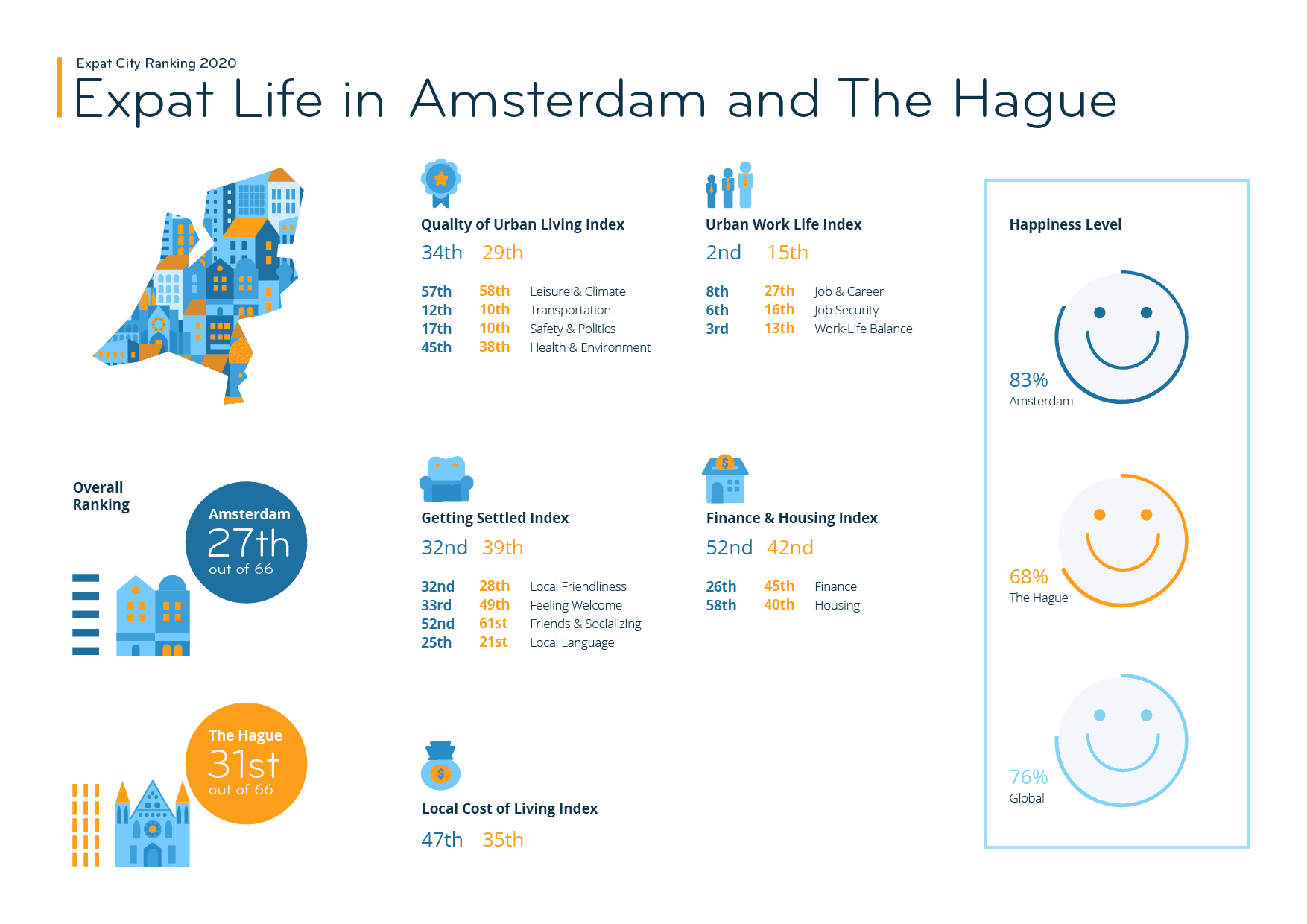
27. Amsterdam, Netherlands
Coming in at 27th place in the Expat City Ranking 2020, Amsterdam receives rather mixed results. The Dutch capital performs very well in the Urban Work Life Index (2nd), ranking just behind Luxembourg City (1st). Close to two in three expats (65%) rate their career prospects positively (vs. 43% globally), and 90% are happy with state of the local economy (vs. 63% globally). An Indian expat says they like “the digital economy and the work opportunities”. Expats in Amsterdam are also satisfied with the public transportation infrastructure (94% vs. 66% globally) and the urban environment (86% vs. 65% globally). However, the city just ranks 34th in the Quality of Urban Living Index, due to the local climate and weather (64th), the availability of healthcare (58th), and the quality of medical care (61st).
Amsterdam receives even weaker results in the Finance & Housing Index (52nd). This is due to its poor ranking in the Housing subcategory (58th), where fewer than one in six survey respondents (16%) state that housing is affordable (vs. 41% globally). Additionally, 64% say it is difficult to find housing there (vs. 27% globally). Amsterdam’s results in the Getting Settled Index (32nd) are also mixed. In the Friends & Socializing subcategory (52nd), more than four in nine expats (45%) find it difficult to make friends (vs. 33% globally), and 28% are unhappy with their social life (vs. 24% globally). However, the language barrier does not seem to be an issue, as 90% of expats say it is easy to get around without speaking the local language (vs. 54% globally).
28. Lausanne, Switzerland
Ranking 28th overall, Lausanne is the second-best-ranking city in Switzerland, right after Basel (24th). It comes in the top 10 of the Quality of Urban Living Index (7th) and is even first worldwide in the Safety & Politics subcategory. All respondents in Lausanne feel safe there, compared to a global average of 82%. What is more, 90% also rate the quality of the urban environment positively (vs. 65% globally). However, Lausanne’s performance in the Getting Settled (33rd) and Urban Work Life Indices (35th) is just about average. A Dominican expat shares that she likes “the security and economical opportunities” most about life in Lausanne. In fact, 95% of expats are especially happy with the state of the local economy (vs. 63% globally). However, just 46% are happy with their career opportunities — which is only slightly above the average of 43%.
The city performs worse in the Finance & Housing Index (43rd): 61% of respondents say it is difficult for expats to find housing (vs. 27% globally). Additionally, only 17% of expats think housing in Lausanne is affordable (vs. 41% globally). “Housing is not very affordable, and the real estate agencies are horrible across the board,” says an Italian expat. On the upside, Lausanne ranks fourth in the Finance subcategory, with 80% of survey respondents happy with their financial situation (vs. 61% globally). Moreover, more than two in three expats in Lausanne (68%) say that their disposable household income is more than enough to cover their living expenses (vs. 51% globally). But this does not seem to compensate entirely for the high cost of living in Lausanne (51st), which 64% of expats rate negatively (vs. 36% globally).
29. Frankfurt am Main, Germany
Overall, Frankfurt comes in 29th place out of 66 cities, performing best in the Urban Work Life Index (5th). Exactly seven in ten expats (70%) are satisfied with their local career opportunities (vs. 43% globally), and 89% rate the state of the local economy positively (vs. 63% globally). A 55-year-old Italian expat living in Frankfurt points out that he likes “being able to find a job, even if you are more than 50 years old”. Frankfurt also ranks very well in the Job Security subcategory (3rd): more than four in five survey respondents (81%) are happy with their job security (vs. 59% globally).
In the Quality of Urban Living Index (25th), Frankfurt comes 20th in the Health & Environment subcategory: five in six expats (83%) are happy with the availability of healthcare (vs. 74% globally), and 77% rate the urban environment positively (vs. 65% globally). “I like that it is clean here and that I have good healthcare coverage,” shares an Indian expat. Maybe it is the high quality of life that makes it hard for expats to find housing. In fact, four in seven expats (57%) have trouble with this (vs. 27% globally), ranking the city 47th in the Housing subcategory. Thanks to its performance in the Finance subcategory (18th), Frankfurt still lands on a mediocre 38th place in the Finance & Housing Index.
The city performs worst in the Getting Settled Index (48th). Only 55% of respondents consider the local residents generally friendly, compared to 68% on a global scale. Moreover, 25% do not feel at home in Frankfurt (vs. 21% globally), and 26% are unhappy with their social life (vs. 24% globally). “People are prejudiced against foreigners,” says a Turkish expat. “If you do not speak German very well, you might experience discrimination. And it takes forever to make local friends.” More than two-fifths of expats (42%) agree that it is not easy to find new friends in Frankfurt (vs. 33% globally).
31. The Hague, Netherlands
Ranking 31st out of 66 destinations in the Expat City Ranking 2020, The Hague performs best in the Urban Work Life Index (15th). With the city coming 16th in the Job Security subcategory, 88% of expats are happy with the state of the local economy (vs. 63% globally). An Italian expat says they like the “job opportunities for people who are over 45 years old.” In fact, 50% of respondents are happy with their local career opportunities (vs. 43% globally).
The Hague ranks slightly above the global average in the Quality of Urban Living Index (29th). Expats are particularly satisfied with the public transportation system (94% vs. 66% globally) and the political stability (91% vs. 61% globally). However, the city only ranks 58th in the Leisure & Climate subcategory, which is mainly due to 54% of expats being unhappy with the local climate and weather (vs. 20% globally).
Similar to Amsterdam, The Hague’s results in the Getting Settled Index (39th) are mixed. The city is among the bottom 10 in the Friends & Socializing subcategory (61st) — expats are unhappy with their social life (41% vs. 24% globally) and have trouble finding friends (49% vs. 33% globally). However, expats like the fact that it is easy to get around without knowing the local language (87% positive ratings vs. 54% globally). The Hague beats Amsterdam in both the Finance & Housing (42nd) and the Cost of Living (35th) Indices. But in comparison with the other cities featured in the ranking, expats in The Hague are still not that satisfied with their financial situation (26% unhappy vs. 21% globally).
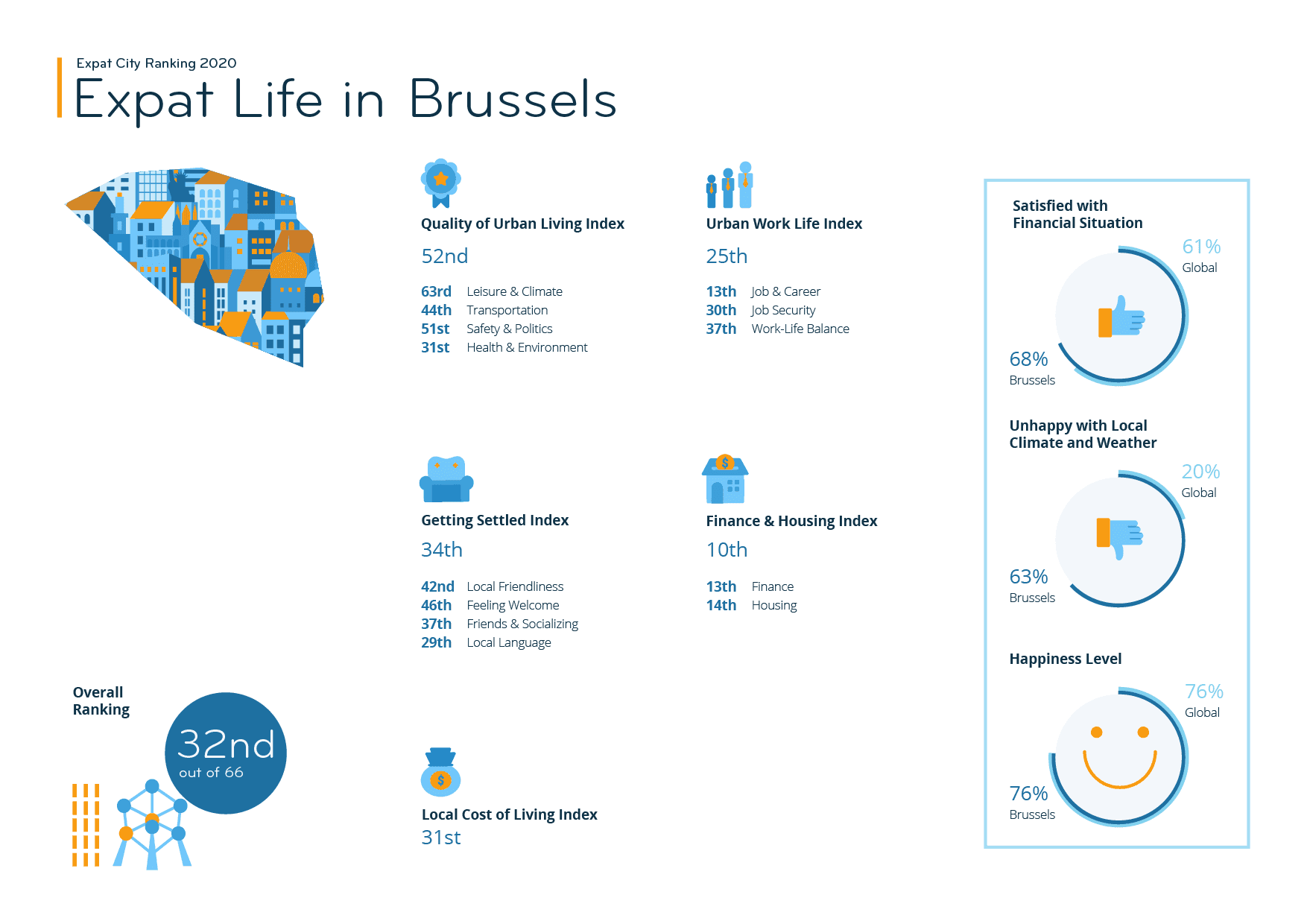
32. Brussels, Belgium
Brussels ranks 32nd out of 66 in the Expat City Ranking 2020, performing especially well in the Finance & Housing Index (10th). Exactly three-fifths of expats (60%) say their disposable household income in Brussels is more than enough to cover their living expenses (vs. 51% globally). Additionally, over two-thirds (68%) rate their financial situation positively (vs. 61% globally), and almost half the expats (48%) find housing in Brussels affordable (vs. 41%). An expat from Romania summarizes: “Life in Brussels is affordable.” What is more, expats are also very satisfied with their jobs in general, ranking the city fifth for this factor. They are very happy with their job security as well (75% vs. 59% globally).
However, Brussels does not perform well in the Quality of Urban Living Index (52nd). The Belgian capital ranks second from the bottom (65th) for climate and weather, only ahead of Salmiya in Kuwait (66th). Close to two in three expats (63%) rate the local climate and weather negatively, more than three times the global average (20%). “After all these years, I still find the grey, rainy weather and cloudy skies depressing,” shares a US American expat. Brussels also ranks low in the Safety & Politics subcategory (51st): just 50% of expats rate the political stability positively (vs. 61% globally), and only 65% feel personally safe (vs. 82% globally). A British expat complains: “I dislike the government, or complete lack of central government.” And a Finnish respondent shares: “For a small town like Brussels, it has all the problems of a big city, such as a high crime rate.”
33. Hamburg, Germany
Coming in 33rd place out of 66 cities in the Expat City Ranking 2020, Hamburg ranks 3rd in the Urban Work Life Index. Here, it performs best among all the German cities featured in the ranking, and on a global scale, only Luxembourg City (1st) and Amsterdam (2nd) do better. Close to two in three expats in Hamburg (66%) are happy with their local career opportunities (vs. 43% globally), and 87% are satisfied with the state of the city’s economy (vs. 63% globally). The city also ranks seventh worldwide in the Job Security subcategory and fifth in the Work-Life Balance subcategory. In fact, 80% rate their working hours positively (vs. 65% globally), and 76% are happy with their work-life balance (vs. 64% globally). “I like the work-life balance and the general stability that comes with living here,” says a Ukrainian expat.
Hamburg also performs well in the Quality of Urban Living Index (22nd), even ranking eighth in the Health & Environment subcategory. Close to nine in ten expats (89%) are happy with the urban environment (vs. 65% globally), and 85% rate the availability of healthcare positively (vs. 74% globally). However, these great results are dragged down by the climate and weather in northern Germany: for this factor, Hamburg (63rd) ranks worst in Germany and among the bottom 5 worldwide. Only expats in Salmiya (66th), Brussels (65th), and Amsterdam (64th) are even less happy with the local climate and weather.
The excellent working life and the good quality of life come at a price: Hamburg ranks 50th in the Finance & Housing Index. While it comes in an above-average 24th place for finance, it lands in the bottom 10 for housing (60th). Just 14% of survey respondents find housing in Hamburg affordable, which is 27 percentage points below the global average (41%). Moreover, nearly two in three expats (65%) complain about the difficulty of even finding a place to live in Hamburg (vs. 27% globally).
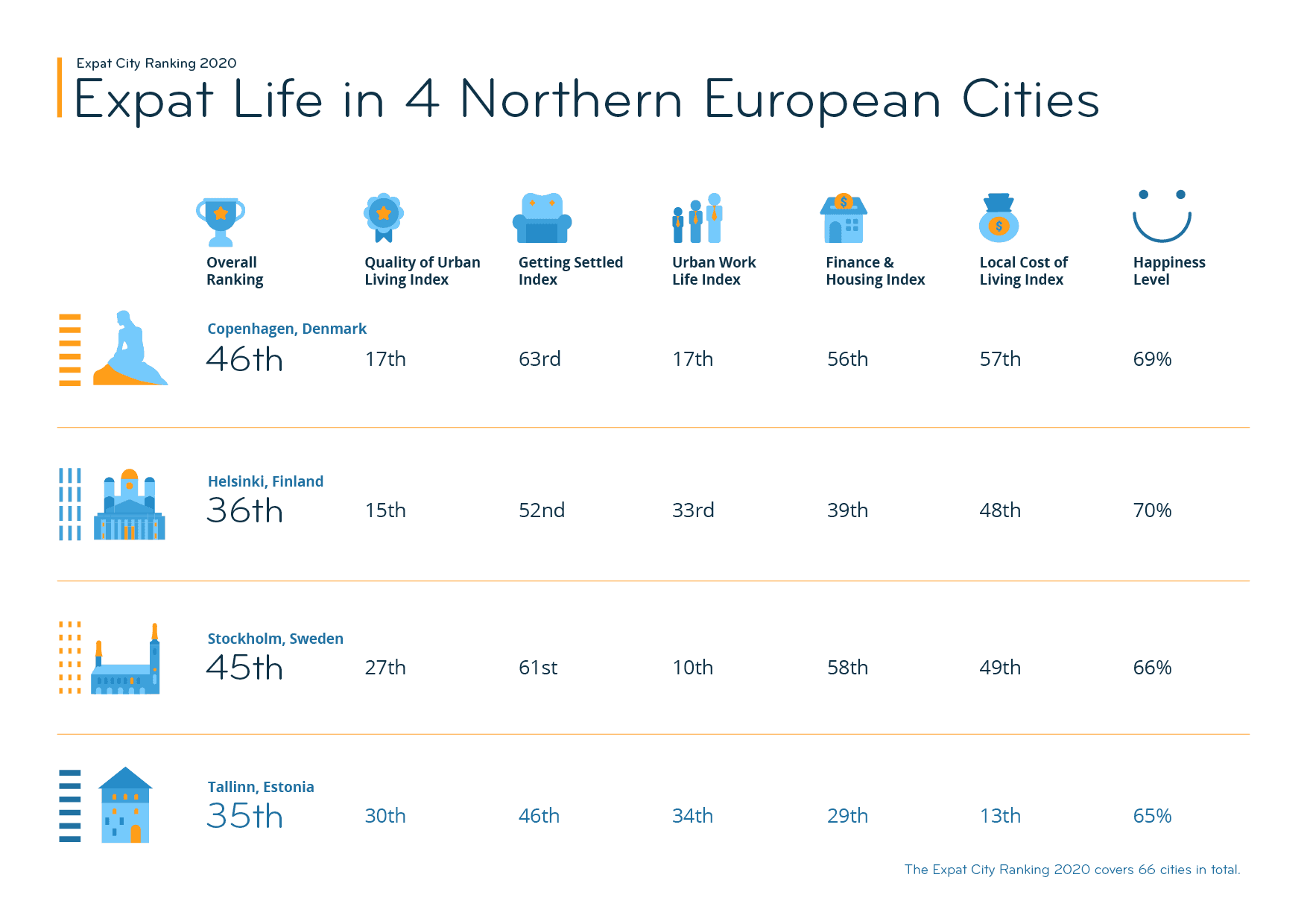
35. Tallinn, Estonia
Placing 35th out of 66 cities, Tallinn receives mid-range results in the Finance & Housing (29th), Urban Work Life (34th), and Quality of Urban Living (30th) Indices. However, in the latter, Tallinn also makes it into the top 10 for its urban environment (8th): 85% of expats are satisfied with this factor (vs. 65% globally). The Estonian capital also performs well in the Local Cost of Living Index (13th), with 49% of respondents being happy with the local cost of living (vs. 46% globally). “It is cheaper to live here,” reveals an expat from Finland.
While the local cost of living is fine, finances still seem to be a sensitive issue in Tallinn, which ranks 54th in this subcategory. In fact, just 51% of survey respondents are happy with their financial situation, compared to 61% worldwide. However, Tallinn’s weakest point is the Getting Settled Index (46th), where it features among the bottom 10 of the Local Friendliness subcategory (58th). Only 35% of expats think that locals are friendly to foreign residents, which is far below the global average of 66%.
36. Helsinki, Finland
Helsinki ranks 36th out of 66 cities, performing especially poorly in the Local Cost of Living (48th) and Getting Settled Indices (52nd). In the latter, the Finnish capital even lands in the bottom 10 of the Friends & Socializing subcategory (58th). Only 30% of expats find it easy to make new friends (vs. 47% globally), and 25% are unhappy with their social life (vs. 24% globally). The results in the Urban Work Life Index (33rd) are rather mixed: expats rank the city 58th out of 66 for overall job satisfaction, and there seems to be a lack of career opportunities (52% negative ratings vs. 34% globally). On the other hand, the city ranks high in the Work-Life Balance subcategory (8th): 77% rate their work-life balance positively (vs. 64% globally), and 75% are happy with their working hours (vs. 65% globally).
Helsinki does best in the Quality of Urban Living Index (15th). More than nine in ten expats (94%) feel safe there (vs. 82% globally), the city coming in seventh place for this factor. Helsinki also ranks among the top 10 in the Transportation subcategory (7th), with 93% of expats being satisfied with the city’s public transportation system (vs. 66% globally). Lastly, Helsinki ranks first worldwide for its urban environment, with 95% of expats rating it positively (vs. 65% globally). An expat from Malaysia likes the “safe and clean environment”, and another expat from the UK appreciates the city’s “green spaces”.
37. Zurich, Switzerland
Zurich comes in 37th place out of 66 cities in the Expat City Ranking 2020 but is one of the worst-performing destinations worldwide in the Getting Settled Index (58th). Many expats do not feel at home in Zurich (30% vs. 21% globally) and find it difficult to get used to the local culture (42% vs. 21% globally). A Dutch expat thinks the city cultivates a “stiff and closed culture”, and a South African expat does not like the “exclusive culture” that makes it “hard to fit in”. Moreover, three in five expats (60%) say it is challenging to find new friends (vs. 33% globally) — the city ranks 64th for this factor, only ahead of Copenhagen (65th) and Stockholm (66th). This might be one reason why more than a third of respondents (34%) are unhappy with their social life (vs. 24% globally). The city also ranks among the bottom 10 in the Local Cost of Living Index (61st), with 74% of survey respondents rating this factor negatively (vs. 36% globally).
However, Zurich performs much better in the Quality of Urban Living Index (11th), where it even ranks sixth for both the Transportation and the Safety & Politics subcategories. More than nine in ten expats (94%) feel safe in Zurich (vs. 82% globally). “I feel fairly safe,” says a Polish expat and adds: “The transport is also great, which is a big plus if you do not have a car.” In fact, 94% of expats are happy with Zurich’s public transportation system, compared to 66% globally. Switzerland’s largest city also ranks above the average in the Urban Work Life Index (29th): 54% of expats in Zurich are satisfied with the local career opportunities (vs. 43% globally), and 91% rate the local economy positively (vs. 63% globally).
41. Munich, Germany
Ranking 41st out of 66 cities worldwide, Munich receives rather mixed results. On the upside, the city makes it into the top 10 in the Urban Work Life Index (9th) — just like all other German cities in the ranking, except for Berlin (30th). Many expats in Munich are satisfied with the local career opportunities (66% vs. 43% globally), as well as the state of the local economy (88% vs. 63% globally). The Bavarian capital also performs well in the Quality of Urban Living Index (12th), ranking third worldwide for its urban environment: 93% of expats rate the latter positively (vs. 65% globally). A US American shares: “Munich is a beautiful city with a lot of green spaces. I love the daytrips to lakes and mountains.” A Brazilian expat also mentions “safety” as an upside of living in Munich, and 93% agree with him (vs. 82% globally).
However, Munich lands among the bottom 10 in both the Getting Settled Index (57th) and the Local Cost of Living Index (59th), even coming second to last in the Finance & Housing Index (65th). Only Dublin (66th) performs worse. Nearly three in four survey respondents (73%) say it is difficult to find housing in Munich (vs. 27% globally), and 83% find the available housing unaffordable (vs. 41% globally). Close to seven in ten (69%) rate the cost of living in general negatively (vs. 36% globally). A Serbian expat says: “The housing here is very expensive, and it is very hard to find a place — even if it is expensive! People hardly respond to your applications, and the current tenants try to force you into buying their furniture.” In terms of getting settled in Munich, 30% describe the local residents as generally unfriendly (vs. 17% globally), and another 30% are unhappy with their social life (vs. 24% globally).
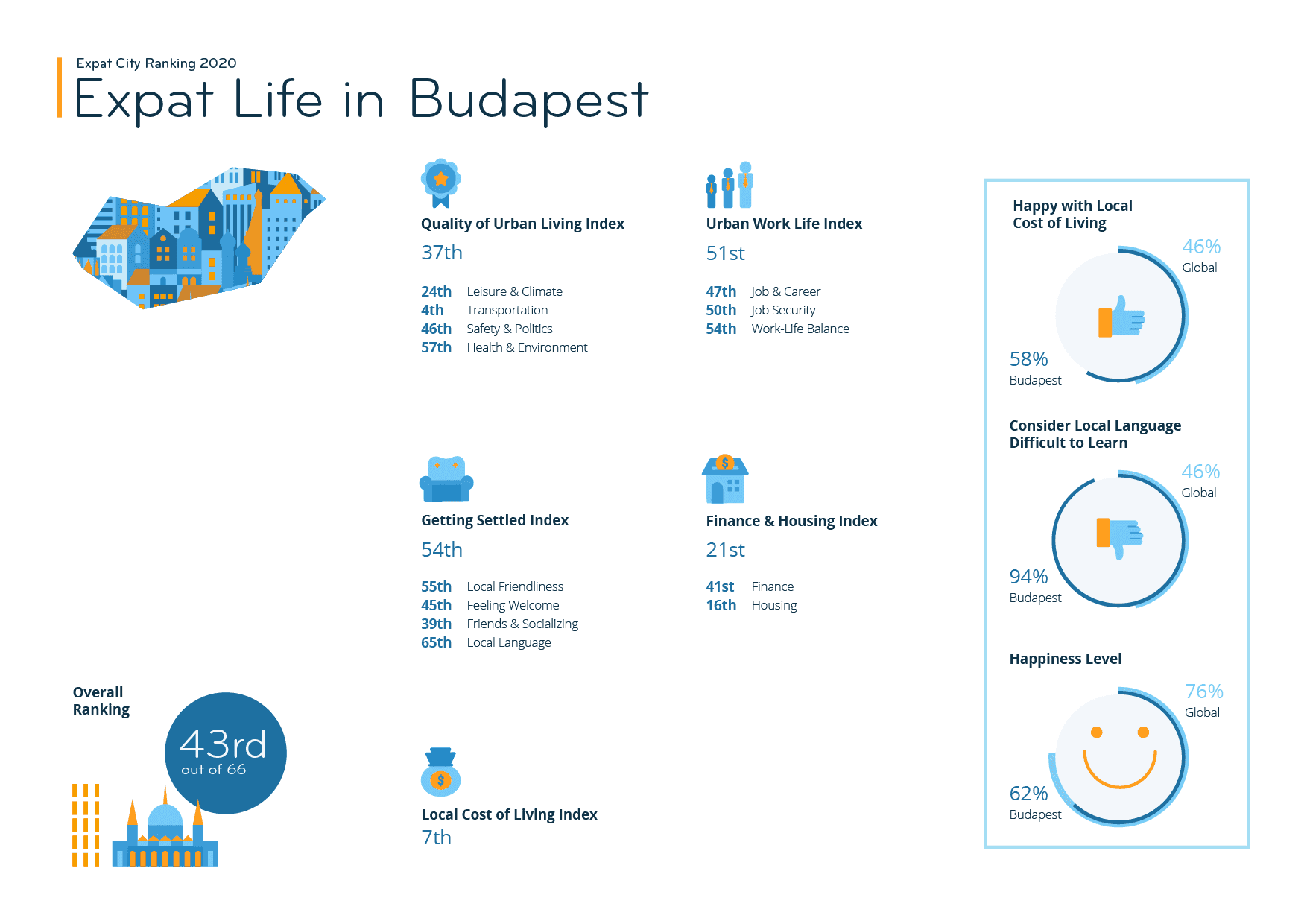
43. Budapest, Hungary
Ranking 43rd out of 66 cities in total, Budapest ends up well in the bottom half of the Expat City Ranking 2020. The Hungarian capital receives its best results in the Local Cost of Living Index (7th): nearly three in five expats (58%) rate the cost of living positively (vs. 46% globally). A Canadian survey respondent shares that “the cost of living is very affordable for the salary I earn.” The city also performs well in the Finance & Housing subcategory (21st), with about two-thirds of expats (66%) saying that it is easy to find housing in Budapest (vs. 55% globally), and 43% rating the affordability of housing positively (vs. 41% globally).
Budapest’s performance in the Quality of Urban Living Index (37th) is rather mixed, the city performing well for transportation (4th) but poorly in the Health & Environment subcategory (57th). “The public transportation is amazing and convenient,” says a South African expat. In fact, all expats (100%) rate Budapest’s public transportation system positively (vs. 66% globally). But Hungary’s capital is nearly the worst for the local availability of healthcare (65th), only ahead of Dublin (66th). Close to three in ten expats (28%) rate this factor negatively (vs. 14% globally).
The Urban Work Life (51st) and Getting Settled (54th) Indices are Budapest’s weakest points. Only 45% of expats describe the local residents as generally friendly (vs. 68% globally), and 31% find it hard to get used to the local culture (vs. 21% globally). According to an expat from Greece, “most locals are not very sociable towards foreigners”.
44. Berlin, Germany
On a below-average 44th place out of 66 cities, Berlin has the second-worst result among the German destinations in the Expat City Ranking 2020.
Although the German capital narrowly misses out on the top 10 for the local cost of living (11th), its performance in the Finance & Housing Index is not as good as might be expected (49th). Nearly two in three expats (64%) consider it difficult to find housing (vs. 27% globally), and only 33% say it is affordable (vs. 41% worldwide). This might be one reason why 24% are not satisfied with their financial situation, a little more than the global average (21%).
Berlin does a lot better in the Quality of Urban Living (31st) and Urban Work Life (30th) Indices. Respondents appreciate the city for its public transportation system (25th), urban environment (20th), and leisure options (16th): 83% rate the latter favorably, compared to 71% globally. But expat life in Berlin is not just all play and no work! Nearly three in five respondents (57%) are also happy with their local career opportunities (vs. 43% worldwide).
Berlin’s poor results in the Getting Settled Index (50th out of 66) bring the overall ranking down. The city even lands among the bottom 10 for general friendliness of the local population (58th). Nearly one in three expats (32%) describe the residents as generally unfriendly (vs. 17%). Nonetheless, 68% feel at home in Berlin (vs. 64% globally). “I don’t know much about Germany,” an expat from Brazil comments, “but I do know a lot about Berlin: here, you can just be yourself.”
45. Stockholm, Sweden
Ranking 45th in the Expat City Ranking 2020, Stockholm receives very mixed results. The Swedish capital performs worst in the Getting Settled Index, coming 61st out of 66 cities. It even places last in the Friends & Socializing subcategory (66th): more than seven in ten expats (72%) find it difficult to make friends in Stockholm (vs. 33% globally), and 42% of expats are unhappy with their social life (vs. 24% globally). An expat from the United States explains that the “attitude towards immigrants can be tough”.
Stockholm also lands in the bottom 10 of the Finance & Housing Index (58th), with especially bad results in the Housing subcategory (62nd). Nearly seven in ten expats (69%) say it is difficult to find housing (vs. 27% globally), and just about one in seven (14%) rate the affordability of housing positively (vs. 41% globally).
On the other hand, Stockholm ranks tenth in the Urban Work Life Index and is voted the best city in terms of work-life balance. A Spanish expat says that they “love the work-life balance”, and 79% of expats agree (vs. 64% globally). Lastly, the city’s urban environment is a positive aspect of expat life in Stockholm, as it ranks second for this factor — just behind Helsinki (1st). More than nine in ten expats (94%) are happy with Stockholm’s environment (vs. 65% globally): for example, a British expat says that they particularly enjoy the “beautiful, clean nature”.
46. Copenhagen, Denmark
Placing 46th out of 66 cities in the Expat City Ranking 2020, Copenhagen ends up in the bottom 10 for nearly all factors featured in the Getting Settled Index. The only exception is the ease to live there without speaking the local language (13th). But expats in the Danish capital really seem to struggle with making new friends, which 59% say this is hard (vs. 33% globally). A Swedish expat shares that it is “difficult to make friends with the Danish locals”. It is no surprise then that 34% are unhappy with their social life as well (vs. 24% globally). Copenhagen can also be found among the bottom 10 of the Local Cost of Living Index (57th): 72% of expats are unhappy with the local cost of living (vs. 36% globally), and 16% even very much so (vs. 8% globally).
On the bright side, Copenhagen ranks 17th in the Quality of Urban Living Index. This is due to its great results in both the Safety & Politics (12th) and the Health & Environment subcategories (10th). In fact, 89% are happy with the political stability (vs. 61% globally), and 95% rate the urban environment positively (vs. 65% globally). Lastly, Copenhagen also receives good results in the Urban Work Life Index (17th), with especially high ratings in the Work-Life Balance subcategory (2nd). Close to nine in ten expats (89%) rate their working hours positively (vs. 65% globally), with a Brazilian expat saying they enjoy the “flexibility and working hours”.
48. Geneva, Switzerland
Coming 48th out of 66 cities worldwide, Geneva ranks among the bottom 5 in the Local Cost of Living Index (65th), with only Hong Kong (66th) performing worse. More than four in five expats (81%) rate the local cost of living negatively (vs. 36% globally). “The cost of living is very high, and the Swiss Franc is way overvalued so that things cost much more than they would elsewhere,” says a US American expat living in Geneva. It is hardly a surprise then that the city also performs badly in the Finance & Housing Index (60th), especially because of its poor results in the Housing subcategory (63rd). Close to four in five survey respondents (78%) find housing in Geneva unaffordable (vs. 41% globally), and 64% say it is difficult to even find housing (vs. 27% globally).
While Geneva also ranks low in the Getting Settled Index (49th), it performs better in the Urban Work Life (31st) and Quality of Urban Living Indices (28th). Similar to the other cities in Switzerland, most expats in Geneva (94%) rate the political stability positively (vs. 61% globally). A French expat says that “the direct democracy” is what he likes most about living in Geneva, and an expat from Canada is happy about the “good bike lanes and excellent transportation infrastructure”. In fact, 89% of expats are also happy with the city’s public transportation system (vs. 66% globally).
49. Stuttgart, Germany
Stuttgart comes in 49th place overall in the Expat City Ranking 2020 and is the lowest-ranking city among all German destinations. While the city has average results in the Quality of Urban Living (32nd) and the Local Cost of Living (36th) Indices, it performs poorly in the Finance & Housing Index (63rd). Nearly four in five expats (79%) say that it is difficult to find housing in Stuttgart (vs. 27% globally), and 78% consider it unaffordable (vs. 41% globally). A Belgian expat points out “the lack of affordable housing” as a downside of living in Stuttgart.
Moreover, the city ranks second to last worldwide in the Getting Settled Index (65th), only ahead of Salmiya in Kuwait (66th). Stuttgart ranks among the bottom 10 in every subcategory of this index: local friendliness (61st), feeling welcome (62nd), friends and socializing (63rd), and local language (62nd). In fact, 43% of expats are unhappy with their social life in Stuttgart, compared to 24% globally. “Finding friends has been really hard,” shares an Australian expat. On top of this, more than two in five survey respondents (41%) find the local residents generally unfriendly (vs. 17% globally), and 33% do not feel at home in Stuttgart (vs. 21% globally). A South African expat lists “people’s general unfriendliness” as one thing she does not like about living Stuttgart.
Similar to the other German cities, Stuttgart at least offers a great working life, ranking sixth worldwide in this index. It comes third for local career opportunities, just behind Dublin (1st) and New York City (2nd), and even first for overall job satisfaction. More than two in five expats (83%) rate the latter positively (vs. 65% globally), and 71% are happy with their local career opportunities (vs. 43% globally). A Russian expat summarizes: “I like the opportunities to develop in your career and in my job in general.”
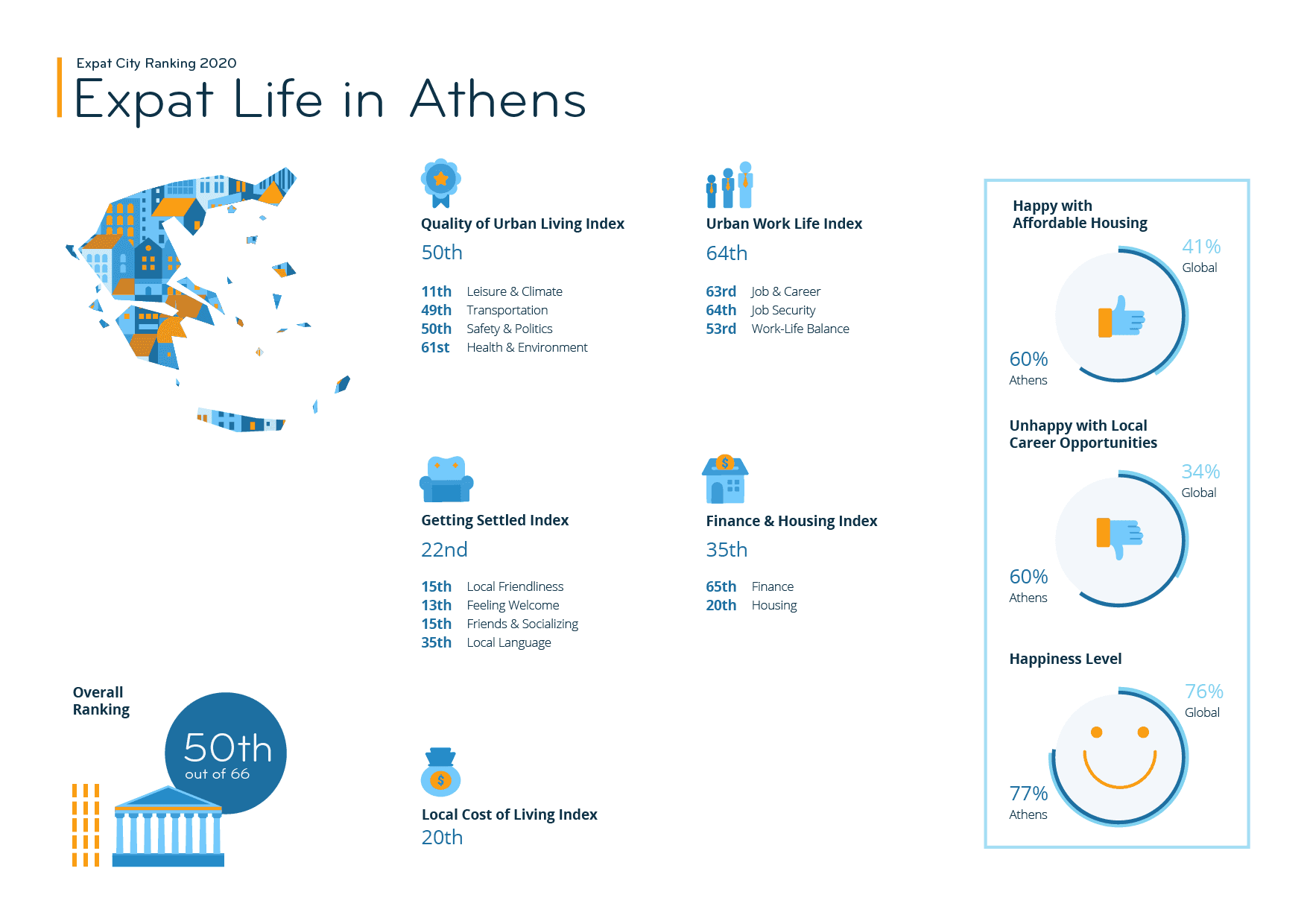
50. Athens, Greece
Athens comes in at a low 50th place out of 66 cities in the Expat City Ranking 2020. The Greek capital performs particularly poorly in the Urban Work Life Index (64th). In Athens, 60% of expats rate the local career options negatively (vs. 34% globally), and more than half (55%) are not satisfied with the state of the local economy (vs. 18% globally). A 58-years-old British expat says that the “job opportunities are not as good as in other countries, especially for my age group”. Athens also performs poorly in terms of finances. In fact, it ranks 65th in the Finances subcategory — only ahead of Milan — and even last in the world for expats’ satisfaction with their personal finances. Only 44% of expats are satisfied with their financial situation (vs. 61% globally). Since housing, however, is both affordable (60% positive ratings vs. 41% globally) and quite easy to find (55% positive ratings vs. 55% globally), Athens still lands in an average 35th place in the Finance & Housing Index.
Athens ranks just slightly better in the Quality of Urban Living Index (50th) than with regard to working life. Expats’ unhappiness with many factors, such as the quality of the urban environment (43% negative ratings vs. 21% globally), cannot be made up for by the great local climate and weather (95% positive ratings vs. 64% globally). Lastly, the Greek capital performs best in the Getting Settled Index (22nd). Over three in four expats (77%) feel at home in Athens (vs. 64% globally), and close to five in six (82%) describe the local population as friendly towards foreign residents (vs. 66% globally). “Greek people are very welcoming and easy-going,” shares a Finnish expat. Additionally, more than two-thirds of the respondents (69%) are happy with their social life in Athens (vs. 59% globally).
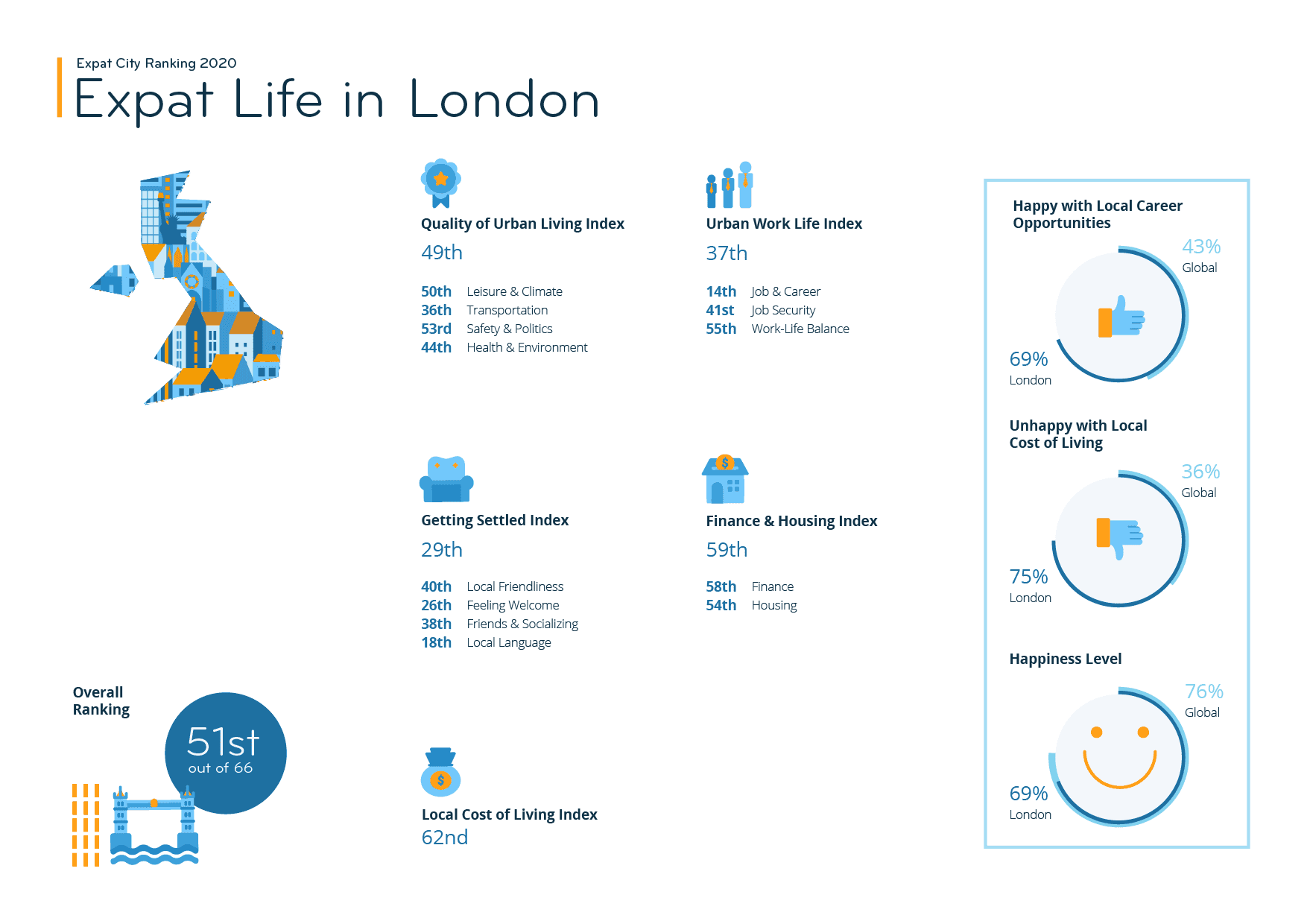
51. London, UK
London ranks 51st out of 66 cities in the Expat City Ranking 2020, and the Finance & Housing Index (59th) is its sore point. Housing is hard to find (38% unhappy vs. 27% globally), and only 8% of expats consider it affordable (vs. 41% worldwide). Just 51% are satisfied with their financial situation in general (vs. 61% globally). “I hate the extortionate cost of living, which results in very small living spaces,” an Australian expat complains. In fact, London comes 62nd in the Local Cost of Living Index.
The quality of life fares little better (49th). Expats are especially worried about their safety, as only 16% feel completely safe (vs. 45% globally). Moreover, they rate the availability (51st) and the quality (57th) of healthcare rather poorly. On the plus side, 83% of expats are happy with the leisure options (vs. 71% globally).
London also provides excellent career opportunities for expats (4th), but they seem to come at a price. Nearly three in ten expats (29%) are not happy with their work-life balance (vs. 18% globally). And despite their career options, respondents are skeptical about the local economy (45th out of 66). Overall, London’s ranking in the Urban Work Life Index is slightly below average (37th). It does best in the Getting Settled Index (29th): 69% consider it easy to get used to the local culture (vs. 61% globally), and 67% feel at home in London (vs. 64% worldwide).
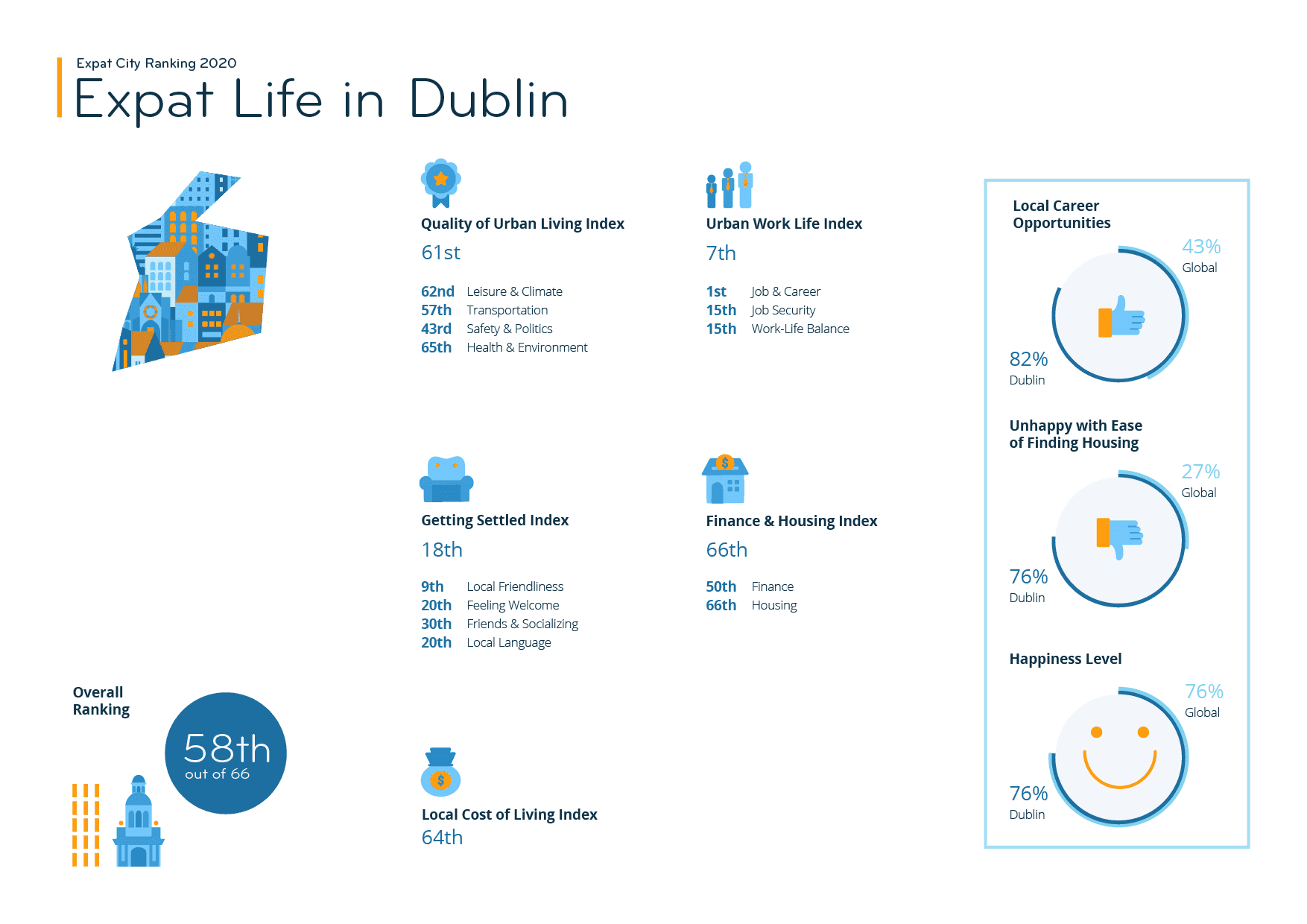
58. Dublin, Ireland
Dublin ranks 58th out of 66 in the Expat City Ranking 2020, coming last in the Finance & Housing Index (66th) and also performing very poorly in the Local Cost of Living Index (64th). More than three in four expats (76%) say it is difficult to find housing (vs. 27% globally), and 88% find local housing unaffordable (vs. 41% globally). Additional, 26% are dissatisfied with their financial situation (vs. 21% globally). A Portuguese expat explains that they only see “extremely bad-quality housing or unaffordable prices, even for normal apartments”.
The Quality of Urban Living Index is another area where Dublin performs poorly (61st), in particular in the Health & Environment (65th) and the Leisure & Climate (62nd) subcategories. In fact, 38% of survey respondents rate the availability of healthcare negatively (vs. 13% globally), and 46% think that medical care in Dublin is of low quality (vs. 16% globally). A Russian expat explains: “To receive a good healthcare treatment, the best option as an expat is leaving to get it elsewhere — not here!”
On the bright side, Dublin ranks 18th in the Getting Settled Index: the majority of respondents says that the local residents are generally friendly (90% vs. 68% globally) and warm towards foreign residents (86% vs. 66% globally). Expats also find it easy to get used to the local culture (71% satisfied vs. 61% globally). However, it is the Urban Work Life Index (7th) that Dublin really excels in. Expats rank the city first worldwide for local career opportunities — 82% are happy with this factor (vs. 43% globally). Dublin also performs well in the Job Security and Work-Life Balance subcategories (15th for both), which might be among the reasons why 69% of expats are satisfied with their jobs in general (vs. 65% globally).
61. Paris, France
Paris ranks 61st out of 66 cities in the Expat City Ranking 2020, performing especially poorly in the Finance & Housing Index (62nd). About three in ten expats (29%) are dissatisfied with their financial situation (vs. 21% globally), and only 19% of expats say it is easy to find housing (vs. 55% globally). Additionally, 70% of expats describe housing in Paris as unaffordable (vs. 41% globally). “Rents are too high, especially in comparison to the low salaries,” says an expat from Bulgaria.
Paris performs better in the Urban Work Life Index (32nd): 59% of expats are happy with their local career opportunities (vs. 43% globally). With two in three expats (67%) rating the local economy positively (vs. 63% globally), Paris also performs slightly above the average in this regard. An expat from the US shares: “My job is fantastic, and I like the employee rights, as well as the relaxed work environment, in France.”
However, Paris nearly lands among the bottom 10 in the Getting Settled Index (55th), with two in five expats (40%) saying that the local residents are not friendly (vs. 17% globally). Well over half the expats (56%) find it difficult to make new friends in Paris (vs. 33% globally). “In general, Parisians are angry, complain too much, and smile too little. It is difficult to make local friends here,” explains a Brazilian expat. This might be why just 53% of expats are happy with their social life in Paris (vs. 59% globally).
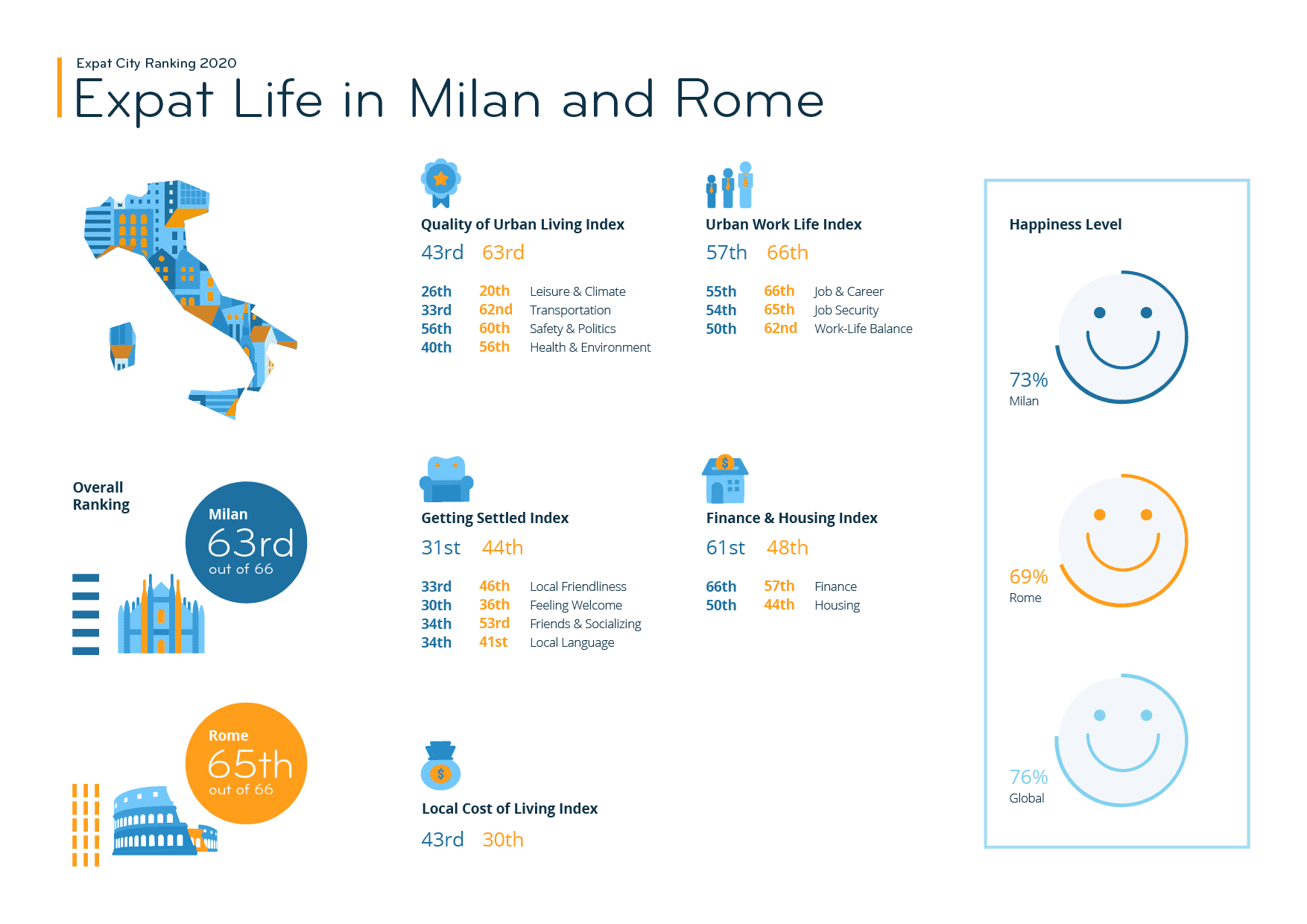
63. Milan, Italy
Coming in 63rd place in the overall Expat City Ranking 2020, Milan ends up among the bottom 10 for the fourth year in a row; it comes only ahead of Seoul (64th), Rome (65th), and Salmiya (66th) in 2020. Milan performs particularly poorly in the Finance & Housing (61st) and the Urban Work Life (57th) Indices. Just 46% of expats are satisfied with their financial situation (vs. 61% globally), and 34% say that their household income is not enough to cover their expenses in Milan (vs. 21% globally). More than three in five expats (62%) also rate the affordability of housing negatively (vs. 41% globally). “It is difficult to find an apartment as an expat — a nightmare,” says an expat from Ukraine. When it comes to their working life, 32% of survey respondents are concerned about the local economy (vs. 18% globally). Maybe this is why only 33% rate their career opportunities positively (vs. 43% globally) and why another 23% are dissatisfied with their jobs (vs. 18% globally).
The Getting Settled Index (31st) is Milan’s strongest point, with 66% of expats finding it easy to get used to the local culture (vs. 61% globally). A US American expat says: “I like the food and the general culture, which strives towards a healthy lifestyle.” However, 19% of respondents say that the local residents are generally unfriendly (vs. 17% globally), and one-fifth (20%) states that people in Milan are not friendly towards foreign residents (vs. 18% globally). Lastly, while 43% find it difficult to live in Milan without speaking Italian (vs. 30% globally), 53% consider it at least an easy language to learn (vs. 37% globally).
65. Rome, Italy
Rome (65th) comes second to last in the overall Expat City Ranking 2020, ranking only ahead of Salmiya in Kuwait (66th) and slightly behind Milan (63rd). Rome comes in last place worldwide in the Urban Work Life Index (66th), with only 8% of survey respondents rating their local career options positively (vs. 43% globally). Three in ten expats (30%) are dissatisfied with their job in general (vs. 18% globally), and 37% feel their job is not secure (vs. 22% globally). More than three in five respondents (62%) are also concerned about the economy in the Italian capital (vs. 18% globally), and 30% are unhappy with their work-life balance (vs. 18% globally). “I do not like the work-life balance and may have to consider moving away from Italy for work,” shares a Canadian expat. “On top of this, the weak economy makes career advancements difficult.”
Rome performs just as poorly in the Quality of Urban Living Index (63rd): expats are dissatisfied with the public transportation system (64% vs. 24% globally), feel unsafe (20% vs. 9% globally), and are unhappy with the urban environment (46% vs. 21% globally). The city performs slightly better in the Getting Settled Index (44th), with more than three in five expats (62%) feeling at home in Rome (vs. 64% globally). Still, 30% of respondents find the local residents unfriendly (vs. 17% globally), and 34% are unhappy with their social life (vs. 24% globally). “Generally, I find the people rude,” says an expat from Mexico. While 34% of expats state that their household income is not enough to cover expenses (vs. 21% globally), Rome does do best in the Local Cost of Living Index (30th). However, this only means rather mediocre results, with 39% of expats expressing their dissatisfaction with the cost of living (vs. 36% globally).
Further Reading
- Best & Worst Cities for Expats in 2020
- Quality of Urban Living Index 2020
- Getting Settled Index 2020
- Urban Work Life Index 2020
- Finance & Housing Index 2020
- Expats in Austria
- Expats in Belgium
- Expats in Czechia
- Expats in Denmark
- Expats in Estonia
- Expats in Finland
- Expats in France
- Expats in Germany
- Expats in Greece
- Expats in Hungary
- Expats in Ireland
- Expats in Italy
- Expats in Luxembourg
- Expats in the Netherlands
- Expats in Portugal
- Expats in Russia
- Expats in Spain
- Expats in Sweden
- Expats in Switzerland
- Expats in the UK
Advertisement
Join InterNations
The community for expats worldwide
Download

